
Dynamics

|
Generational Dynamics |
| Forecasting America's Destiny ... and the World's | |
| HOME WEB LOG COUNTRY WIKI COMMENT FORUM DOWNLOADS ABOUT | |
Russian fighter jets patrolling the Ukraine border
This morning's key headlines from GenerationalDynamics.com
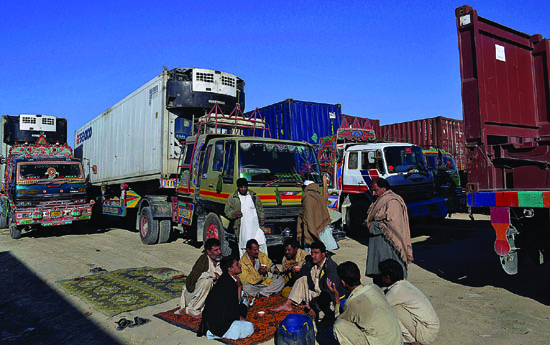 |
In a major policy reversal, the government of Pakistan's prime minister Nawaz Sharif is planning to launch a full-scale military offensive against the Pakistani Taliban (Tehrik-e-Taliban - TTP). The attack will be focused in the Taliban strongholds in the tribal area that borders Afghanistan.
This is a reversal of a bizarre policy of trying to end terrorist attacks by "negotiating" and "peace talks" with the TTP. When Sharif was elected as prime minister in May of last year, he said that he would fulfill campaign promises by opening negotiations. But as soon as the peace talks were proposed, the TTP immediately started to impose conditions: TTP prisoners must be released from jail, the army must be withdrawn from the tribal areas where it has been fighting the Taliban, and the government must agree to impose Sharia law on the country. Furthermore, the TTP promised that they would continue terrorist attacks while the "peace talks" were proceeding. Finally, the Sharif administration is becoming tired of allowing the TTP to humiliate him over and over.
There's been no official announcement of when the military operation will begin, but an unnamed Pakistani official says that that Pakistan already has 150,000 troops in the tribal region ready to "begin a full-fledged clearing operation."
Pakistan's new policy is focused on restricting attacks within its borders. That means that militants who use Pakistan for a staging base to attack U.S. and Afghan forces in neighboring Afghanistan will still be allowed to operate, as long as they observe a cease-fire in Pakistan. The News (Pakistan) and McClatchy and Dawn (Pakistan)
The Movement for Justice party, which governs Pakistan's northwest province (Khyber Pakhtunkhwa) announced on Thursday that it was ending its blockade of the "Khyber pass," a major route into Afghanistan. This route was heavily used by Nato forces to truck equipment between the port of Karachi and Nato bases in Afghanistan. Nato was still able to use other, less convenient, routes, but reopening this route solves a major headache for Nato, as it tries to move equipment out in anticipation of the end of Nato's military actions in Afghanistan.
The blockade was announced in November by the party's leader, Imran Khan, who is a former cricket superstar who has turned into a very anti-American politician. He claimed that the terrorist attacks in Pakistan were caused by American drone strikes on Taliban terrorists, and he announced that the blockade would continue until the American drone strikes ended. The American drone strikes did end in December, at least for the time being, and that was given as a reason on Thursday for ending the blockade.
This is a significant change of policy, because it's the end of the "hope and change" fantasies that were fostered by both Sharif and Khan in telling the Pakistani people that America was to blame for the Taliban's terrorist attacks in Pakistan. That was always pretty obvious anyway, since the vast majority of the attacks were on Shias and Sufis, whose extermination was completely unrelated to either American drone strikes or Nato's activities in Afghanistan.
The change is significant also for the reason that it could lead to a conflict that could spiral into a larger war within Pakistan, which could then spiral into a wider war in the region. The bloodiest refugee crisis in the 20th century was the war between Hindus and Muslims that followed Partition, the 1947 partitioning of the Indian subcontinent into Pakistan and India. Generational Dynamics predicts that the partition war will be re-fought. It's now been over 60 years since that war ended, and all the generations of survivors of that war are gone. The time is ripe, and a new war could begin at any time. Daily Times (Pakistan) and AP and SATP (India)
A day after it was revealed that 150,000 Russian troops were massed on the border with Ukraine, Russian fighter jets began patrolling the border. Concerns are rising that a Russian invasion of Ukraine is about to begin, possibly with the objective of annexing Crimea to Russia, in the same way that Russia annexed two provinces of Georgia by means of an invasion in 2008.
However, U.S. Secretary of State John Kerry allayed all those concerns on Thursday by announcing that he had just spoken to Russian Foreign Minister Sergei Lavrov, who assured him that large-scale Russian military exercises near the Ukrainian border were previously scheduled and not connected in any way to the unrest in Ukraine. Voice of America
With a referendum on scheduled for September 18 for Scotland to decide whether it wants to separate from Britain and become an independent country, a large pension firm that employs 5,000 people in Scotland out of a total head count of 8,500 says that it's already making preparations to move some of its operations out of Scotland if the vote on the referendum is "yes." The company, Standard Life, is based in Edinburgh and has been based in Scotland for 189 years, so the loss would be significant. The announcement strikes a symbol blow against the referendum, which polls already indicate will be voted "no" in September. BBC
(Comments: For reader comments, questions and discussion, see the 28-Feb-14 World View -- Pakistan reverses itself, plans large-scale military attack on Taliban thread of the Generational Dynamics forum. Comments may be
posted anonymously.)
(28-Feb-2014)
Permanent Link
Receive daily World View columns by e-mail
Donate to Generational Dynamics via PayPal
Hezbollah vows retaliation for Israel's air strike in Lebanon
This morning's key headlines from GenerationalDynamics.com
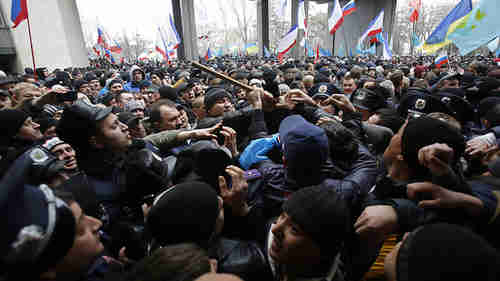 |
Long-dormant World War II hatreds came alive again on Wednesday, when ethnic Russians clashed with ethnic Tatars outside of Crimea's parliament building in Simferopol in southern Ukraine. Thousands of Tatars demonstrated in front of the Crimean parliament on Wednesday to block deputies from passing any legislation that would support the separation of Crimea from Ukraine. According to one Tatar activist:
"We warned them not to arrange a [parliamentary] session. Do not explode the situation in the Crimea. We know they need that session to tear Crimea from Ukraine. We warned that the Crimean Tatars will not allow this to happen."
As the Tatars chanted "Ukraine" and "Motherland! Crimea! People!", pro-Russia demonstrators gathered, shouting "Crimea is Russia!" According to one pro-Russia activist:
"We are here to defend ourselves from those western Ukrainians, who think they can decide our future here in Crimea. They never asked us what we wanted. We've spoken Russian for 200 years here, and we're not going to start speaking that Ukrainian. It's not even a real language, it's a dialect."
Russia's dictator Josef Stalin, who had already engineered the massive famine in Ukraine in the 1930s, in 1944 deported 200,000 Tatars from Crimea, where they had lived for centuries, to central Asia, accusing them of collaborating with the Nazis. It was only in the 1980s and 1990s that the Tatars returned in large numbers to Crimea, particularly after the collapse of the Soviet Union and Ukraine's independence. However, the bitter feelings between the Russians and the Tatars still remains, and could spiral into a bloody confrontation. Ria Novosti and CS Monitor
Russia's president Vladimir Putin on Wednesday ordered war games involving 150,000 troops along the border with Ukraine. This followed several days of activities, as trucks full of armed Russian troops arrived at the Black Sea port of Yalta, and armored personnel carriers arrived at Sevastopol. Russia's Defense Minister Sergei Shoigu said Moscow was "carefully watching what is happening in Crimea." He claimed that no invasion of Ukraine was planned, but also said:
"The commander-in-chief [Vladimir Putin] has set the task of checking the capability of the armed forces to deal with crisis situations posing a threat to the military security of the country,"
The United States warned Russia against interference in the crisis, saying military intervention by Moscow would be a "grave mistake". Ria Novosti and Washington Times and Telegraph (London)
Lebanon's Iran-backed terror group Hezbollah vowed to "choose the appropriate time, place and method of response" to retaliate against Israel for an air strike on Monday. The target of the air strike is unknown, though Hezbollah claimed that "no one was martyred or wounded," and there was only "material damage." However, some security sources say that the strike hit two trucks transporting missiles and a missile launcher into Lebanon, and that four Hezbollah members were killed. Israeli defense officials are expecting Hezbollah to target senior Israeli figures in the future, in retaliation for Monday’s air strike. Daily Star (Beirut)
France, which already has thousands of peacekeeping troops in former colonies Mali and Central African Republic, is now being asked to help a former British colony, Nigeria, to deal with the growing threat by the jihadist terror group Boko Haram ("Western education is forbidden"). The request was triggered by a horrific terror attack on a school in northeastern Nigeria on Tuesday where 29 boys were killed, and the girls were told to go home, get married, and abandon Western education. There had been soldiers guarding a checkpoint near the government school, but they were mysteriously withdrawn hours before the attack, leaving the terrorists to continue their massacre for five hours, with no troops or security agents intervening. Nigeria's government also asked for help from neighboring Cameroon, saying that the terrorists hide out in Cameroon. (Paragraph corrected. 27-Feb) Nigeria Bulletin and Oman Observer
(Comments: For reader comments, questions and discussion, see the 27-Feb-14 World View -- Russia masses troops on Ukraine border, as ethnic Russians and Tatars clash thread of the Generational Dynamics forum. Comments may be
posted anonymously.)
(27-Feb-2014)
Permanent Link
Receive daily World View columns by e-mail
Donate to Generational Dynamics via PayPal
China considers two new anti-Japanese national holidays
This morning's key headlines from GenerationalDynamics.com
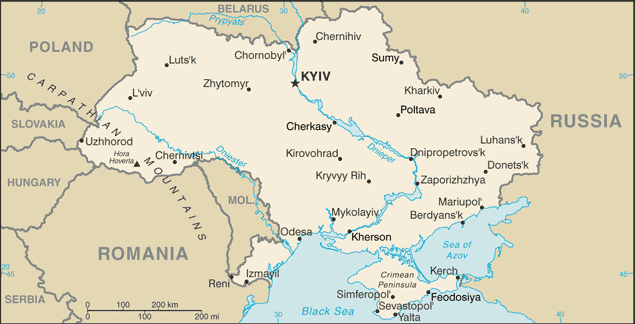 |
As we've discussed several times, western Ukraine is mostly populated by Ukrainian-speaking ethnic Ukrainians, while eastern Ukraine is mostly populated by Russian-speaking ethnic Russians. However, even eastern Ukraine isn't entirely Russian, and although the Russian language is spoken there, it's spoken with a Ukrainian accent.
The exception is the Crimea, the body of land at the bottom of Ukraine, jutting into the Black Sea, and connected to mainland Ukraine by a narrow strip of land. This is the most Russian part of Ukraine, and the most Russian part of Crimea is the port of Sevastopol, a strategically important naval port hosting Russia's Black Sea fleet. This is the place to which deposed Ukrainian president Viktor Yanukovych fled over the weekend, and he has not been seen publicly since then. It's impossible to predict what will happen to Ukraine from the current crisis, but one thing is certain: Russia will not let go of Sevastopol.
Talk of "separatism" is high in Sevastopol. And we're not talking about separatism of east Ukraine from west Ukraine. We're talking about separation of Crimea from the rest of Ukraine. Sevastopol's city council on Monday already demanded a referendum on rejoining what they call "The Motherland."
The situation has become sufficiently alarming that even Moscow is backing down a bit. Two days ago, Russia's prime minister Dmitry Medvedev referred to the situation as "an armed uprising" by "people with black masks strolling through Kiev with Kalashnikov rifles."
But on Tuesday, Russia's foreign minister Sergei Lavrov was considerably more subdued:
"We are using our contacts with the various political forces at play in Ukraine in order to calm the situation down.[It is] dangerous and counter-productive to try to force upon Ukraine a choice on the principle of 'you are either with us or against us'. We want Ukraine to be part of the European family in every sense of the word."
Whether this reference to the "European family" represents a change in policy remains to be seen, but it's certainly a change in rhetoric.
The possibility of Crimea rejoining Russia is of greatest concern to the Tatars, a mostly Turkic language speaking Sunni Muslim ethnic group, currently numbering around 300,000. Russia's dictator Josef Stalin, who had already engineered the massive famine in Ukraine in the 1930s, in 1944 deported 200,000 Tatars from Crimea, where they had lived for millennia, to central Asia, accusing them of collaborating with the Nazis. It was only in the 1980s and 1990s that the Tatars returned in large numbers to Crimea, particularly after the collapse of the Soviet Union and Ukraine's independence.
Tatars are concerned that a return to Russia rule would mean "the end of the Crimean Tatars," according to one activist:
"If the violence in Ukraine were to spread to Crimea, 300,000 Crimean Tatars would come face to face with approximately 2 million Russians living there. Soldiers in Russia's Black Sea Fleet in the port of Sevastopol are ready to invade Crimea. The parliament of the Autonomous Region of Crimea is under the control of Russia, is predominantly of Russian ethnicity and is against the Crimean Tatar National Assembly and Crimean Tatars."
CS Monitor and Telegraph (London) and Zaman (Istanbul)
The U.S. State Department said that two first secretaries and a second secretary at Venezuela's embassy in Washington had been declared personae non gratae, and have been given 48 hours to leave the country. The expulsion is tit-for-tat reprisal for Venezuela's expulsion of three American diplomats last week. Venezuela's president Nicolás Maduro expelled three U.S. diplomats last week on accusations of recruiting students to hold violent, rock-throwing protests against him. Washington has rejected the claims as baseless. Reuters
Gunmen from Nigeria's Islamist terrorist group Boko Haram ("Western education is forbidden") stormed at 2 am Tuesday, and killed 29 pupils, all boys, many of whom were burnt to death by a fire. The girls were spared, and were told to go home, get married, and abandon Western education. The school was secular, and students were both Christian and Muslim.
Outrage is growing in Nigeria because Boko Haram has killed thousands of civilians, but the armed forces are failing to protect them, or even respond to raids. In this case, there had been soldiers guarding a checkpoint near the government school, but they were mysteriously withdrawn hours before the attack. And then the terrorists were able to continue their massacre for five hours, no troops or security agents intervening. It's believed that the soldiers knew the attack was coming, and then withdrew either because they wanted to support the terrorists, or because they were afraid of being killed themselves. BBC and CBS News
Laws have been submitted to China's National People's Congress to add two new holidays to the list of China's national holidays:
The proposed law is expected to pass. BBC and Bloomberg
(Comments: For reader comments, questions and discussion, see the 26-Feb-14 World View -- Ukraine's 'separatist' talk threatens ethnic Tatars thread of the Generational Dynamics forum. Comments may be
posted anonymously.)
(26-Feb-2014)
Permanent Link
Receive daily World View columns by e-mail
Donate to Generational Dynamics via PayPal
Russia says Ukraine chaos is a 'real threat' to its interests
This morning's key headlines from GenerationalDynamics.com
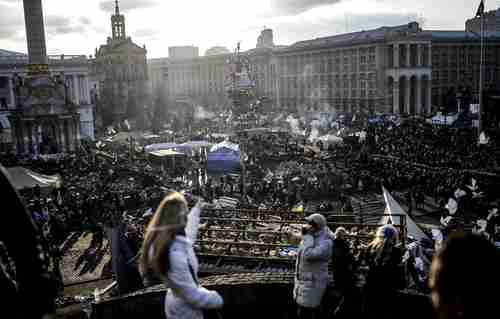 |
Government has essentially disappeared in Kiev, the capital of Ukraine, with such functions as are available being performed by activists who participated in the overthrow of president Viktor Yanukovych, with the support of the parliament. These activists mostly represent ethnic Ukrainians, and are mostly pro-European and often bitterly anti-Russian, blaming Russia and Ukraine's ethnic Russians for Yanukovych's brutal violence that killed dozens of young activists. The activists have issued an arrest warrant for Yanukovych, accusing him of "mass killings" of civilians.
There are reports that the parliament is considering a law that would remove Russian as one of Ukraine's official languages, and some even want to go so far as to remove citizenship status from ethnic Russians in Ukraine. This has sparked anti-Ukraine nationalism in Russia, where there are discussions of granting citizenship to ethnic Russians from Ukraine.
On Monday, Russia's prime minister Dmitry Medvedev said that what is going on is a "real threat" to Russia:
"We do not understand what is going on there, there is a real threat to our interests and to the lives and health of our citizens.Strictly speaking, today there is no one there to communicate with. The legitimacy of a number of power bodies is in huge doubt. If you consider people in black masks strolling through Kiev with Kalashnikov rifles a government, then it will be difficult for us to work with such a government.
Some our foreign, western partners hold the opposite opinion, they think these people to be legitimate power bodies. I do not know what constitution and what laws they have been reading, but I hold that it is some sort of conscience aberration when you call something legitimate while in reality it is a result of an armed uprising."
Yanukovych has disappeared, and his whereabouts are unknown. According to some reports, he was last spotted in Balaclava, a town near Russia's Sevastopol naval base in Crimea on the Black Sea. According to the reports, he drove off with a 3-car convoy late on Saturday night, and hasn't been seen since. Ria Novosti and Russia Today and Reuters
Ukraine is on the brink of default, following years of massive government corruption and government overspending. In December, Russia promised a bailout loan of $15 billion, but that was before president Viktor Yanukovych was overthrown.
There are some reports that Russia is considering sending troops into Kiev, but almost everyone considers that highly unlikely, inasmuch as Russia can make Ukraine suffer financially. Ukraine's economy depends heavily on natural gas from Russia's Gazprom. Ukraine owes Gazprom $3 billion, and Russia could cut off all gas transmissions at any time. Russia could also cut off Ukrainian exports to Russia.
Ukraine says that it's going to need a $35 billion bailout for 2014 and 2015. It seems likely that the U.S., the IMF and the European Union are going to be asked to provide that bailout. Bloomberg
History is repeating itself as the "Troika" of organizations bailing out Greece -- the European Commission (EC), the European Central Bank (ECB) and the International Monetary Fund (IMF) -- are in a bitter dispute with Greece's government over the amount of bailout money needed by Greece. Greece claims that it needs only 5.5 billion euros, while the Troika has done an analysis and comes up with a figure close to 20 billion euros.
One reason that Greece needs more money than anticipated is because one of its austerity measures -- the reduction of lump sum pension payments to civil servants -- has been declared unconstitutional by a Greek court. The Troika will demand that Greece take other measures to reduce its debts. The disagreement between Greece and the Troika is mostly internal right now, but if it's now resolved quickly, then it will become a very big, public fight. Greek Reporter and Kathimerini
(Comments: For reader comments, questions and discussion, see the 25-Feb-14 World View -- U.S., IMF, EU facing bailout requests from Ukraine and Greece thread of the Generational Dynamics forum. Comments may be
posted anonymously.)
(25-Feb-2014)
Permanent Link
Receive daily World View columns by e-mail
Donate to Generational Dynamics via PayPal
Russia on top of the world as Sochi Olympics games end
This morning's key headlines from GenerationalDynamics.com
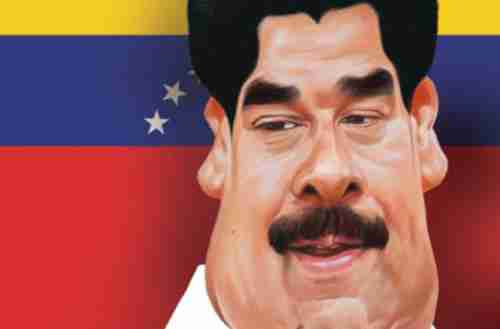 |
Hundreds of pro-government demonstrators, most of them older people, marched through Caracas on Sunday, for the "March of Seniors." However, it's the anti-government demonstrators that are threatening the government of Venezuela's president Nicolás Maduro. And the reason that Venezuela is unraveling is because crime and the economy continue to worsen. The inflation rate at 56% is the highest in the world. he murder rate is 25,000 annually, one of the world's highest per capita rates, and 97% of the murders go unpunished. The supermarket shelves are bare, with shortages of almost every basic product needed for day to day living.
Maduro has reacted to these problems ordering supermarkets to slash prices, jailing business owners as "speculators," and sending troops to stores to liberate washing machines "for the people." He's closed down independent television stations, deported CNN reporters, and jailed opponents.
Maduro doesn't have anything close to the charisma of his predecessor, Hugo Chávez, who died last year and left behind an economy close to disaster. According to one Maduro opponent, Chavez’s gift for showmanship enabled him to create distractions and defuse frustration, but Maduro, stiff and wooden in comparison, relies more on thuggery. So although the "March of Seniors" is demonstrating in favor of the current government, Maduro's tin ear, combined with the worsening economy and crime situation, is putting the entire Socialist government in danger.
And the end of Venezuela's Socialist government would have a profound impact on Cuba's Socialist government, because it would mean the end of Venezuela's subsidies. Venezuela ships around 100,000 barrels per day of subsidized oil to Cuba, and gives employment to thousands of Cuban doctors, sports instructors and military advisors in Venezuela. Venezuelan opposition activists have been demanding for an end to these subsidies, at a time when Venezuela's economy is so poor. CNN and Gulf News and Miami Herald
Zimbabwe's President Robert Mugabe, who has been president since 1980, celebrated his 90th birthday on Sunday. Mugabe's party, the Zimbabwe African National Union-Patriotic Front (ZANU-PF), operate as de facto enforcers of government policies and commit assault, torture, rape, extralegal evictions and executions without fear of punishment.
Mugabe's actions are mostly based on the historical enmity of two tribes -- Mugabe's Shona tribe, and his enemies, the Ndebele tribe. Genocidal warfare occurred between these two tribes in previous generational crisis wars -- the Mfecane war that climaxed in 1828, the Matabele Wars that climaxed in 1897, and the Rhodesia civil war, climaxing in 1979. It was the last war that gave Zimbabwe independence, making Mugabe the President.
In 1983, to consolidate his hold on power, Mugabe launched "Operation Gukurahundi" (The rain that washes away the chaff before the spring rain). 20,000 people, almost all of them from the Ndebele tribe, were tortured, raped and slaughtered.
As recently as the 1999, Zimbabwe was a breadbasket of Africa, exporting up to 500,000 metric tons of surplus food. By 2003, Zimbabwe was starving. What happened during those three years was a Marxist socialist "land reform" program by Robert Mugabe that confiscated 4,500 white-owned commercial farms and redistributed the property to his own Shona ethnic group.
After 2003, more and more Zimbabweans have been dying of starvation, because Mugabe has destroyed the farm infrastructure. By 2008, the official rate of inflation was 231 million percent. Today, Zimbabwe's official currencies are the U.S. dollar and the South African rand. Zimbabwe was a wealthy country until 2000, until Mugabe almost literally destroyed it single-handedly.
There is no obvious successor to Mugabe, and it's believed that if he left the scene, then there would be new violence between the Shona and Ndebele tribes. Independent (Ireland)
 |
There were doping scandals and gay rights controversies, but overall Russia seems to done pretty well as host of the Winter Olympics in Sochi. Russia's athletes came out way ahead of everyone else, with 13 gold medals out of 33 total, ahead of Norway (11 gold out of 26 total), Canada (10 out of 25), and the United States (9 out of 28).
Russia conducted the biggest security operation in Olympic history, with a flotilla of naval vessels in the Black Sea, around 50,000 police and security personnel on the ground, the interception of data and emails, and surface to air missiles deployed in strategic positions. It worked, because there were no reported terrorist incidents in Russia during the Olympics games. According to IOC President Thomas Bach in the closing ceremony:
"Tonight we can say: Russia delivered all what it had promised. What took decades in other parts of the world was achieved here in Sochi in just seven years.Through you [the Russian people], everybody with an open mind could see the face of a new Russia: efficient and friendly, patriotic and open to the world. We arrived with great respect for the rich and varied history of Russia. We leave as friends of the Russian people."
Off-topic, I found the following chart to be interesting:
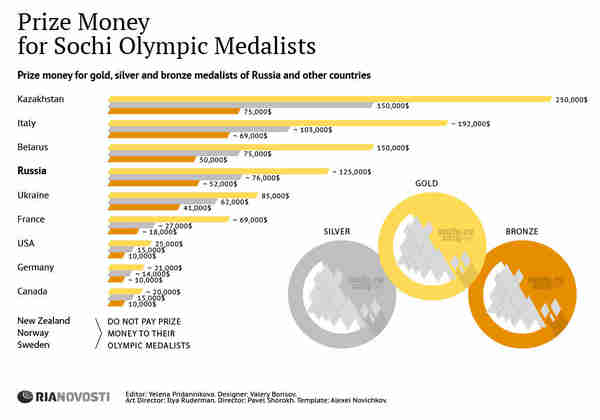 |
It looks like the Kazakhstan really wants to encourage their people to participate. Reuters and Ria Novosti
(Comments: For reader comments, questions and discussion, see the 24-Feb-14 World View -- Mass murderer Robert Mugabe of Zimbabwe has 90th birthday thread of the Generational Dynamics forum. Comments may be
posted anonymously.)
(24-Feb-2014)
Permanent Link
Receive daily World View columns by e-mail
Donate to Generational Dynamics via PayPal
President Obama draws another line, and tells Ukraine not to cross it
This morning's key headlines from GenerationalDynamics.com
 |
On a day of fast-moving events in Ukraine, the parliament voted to dismiss president Viktor Yanukovych from office, and to free Yulia Tymoshenko immediately. Once freed, Tymoshenko gave a riveting, passionate speech to the huge crowd in the Maidan (Independence Square) in Kiev:
"There is a new Ukraine. The heroes of the Maidan are saviors and the saviors of Ukraine. I wanted to come to the barricades on Grushevskogo and I want to feel how our brave men and women were defending us and were willing to give their lives to protect this sacred place that will always be in our hearts.I was blaming myself that I wasn’t able to be here. Every time I saw a man fall down the bars of the prison were holding me back. They died to give us the opportunity to change what we had before. Each politician who might betray you should remember the faces of the dead heroes.
In any case you should not leave the Maidan until everything you strive for is achieved. You should go on to the end. No one has the right to step back from here. There is no way back.
It was not politicians or diplomats or world leaders who made this happen. It is you, the people who stood on Maidan, who changed the situation.
It was never a fair fight. How can it be a fair fight when you have a wooden shields against sniper rifles and kalashnikovs. But the people knew it was not fair and they continued. ...
We must bring Yanukovych and the scum that surrounds him to Maidan. ...
The snipers who put their bullets through the hearts of our heroes but a bullet in all our hearts. And it will never be removed until every one of them is punished. Everyone will be punished for what they do wrong.
This nation will never again fall to its knees. No one will ever again do this to us because we will never let them."
The call to bring Yanukovych back to Kiev to be punished will be significant. The whereabouts of Yanukovych are unknown, but it's thought that he's in Kharkiv in eastern Ukraine, near the Russian border, after being prevented from taking a plane to Moscow.
There have been some reports that officials in Moscow are very contemptuous of Yanukovych because he was took weak during the crisis. The people in Moscow prefer someone like Syria's psychopathic president Bashar al-Assad who conducted "industrial strength" torture and extermination on his own civilians, using sarin gas against his own people. Yanukovych was apparently unwilling to do stuff like that, or he was prevented from doing so by parts of his army, and so he's worthless to the folks in Moscow.
Yulia Tymoshenko received wild cheers during her speech on Saturday, but she's apparently not all that popular. The presidential elections have been rescheduled to May 25, and she said on Saturday that she's going to run for president, but she may not be able to win. She's extremely unpopular with the eastern 1/3 of Ukraine, which consists mostly of Russian-speaking ethnic Russians. The western 2/3 are mostly Ukrainian-speaking ethnic Ukrainians, but not everyone there loves her either. She's 53 years old, making her part of that old, corrupt generation, in the view of many activists. She was prime minister twice in the past, and there were a lot of problems both times. As one Ukrainian activist said, "She's good at leading a revolution, but not so good at leading the government." Telegraph (London) and Europe Online
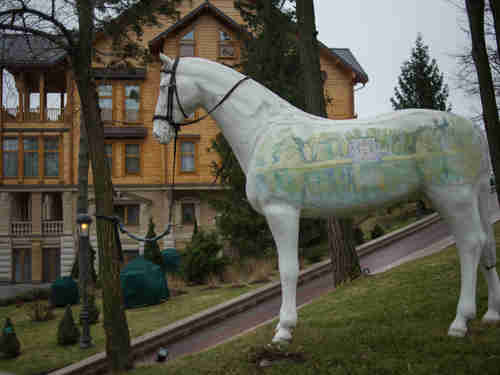 |
President Viktor Yanukovych is disliked even among his supporters in eastern Ukraine because of his opulent lifestyle and alleged corruption. Even in the issue of aligning with the European Union or Russia, the issue that triggered the series of demonstrations in December, many people believe that Yanukovych's flip-flop was made not because it would benefit Ukraine, but because it would benefit his bank account.
The president's walled-off compound has been well-guarded and completely off-limits to the public, and on Saturday it became clear why, as the guards were removed, and thousands of Ukrainians streamed into the compound to see what was going on. Yanukovych had always refused to talk about his residence, admitting only to living in a modest house on a small plot inside the compound.
But what they saw was quite different. There were posh mansions standing amid manicured lawns. There were parks dotted with statues, ponds with fountains and wild ducks, a tennis court, a golf course and a colonnaded pavilion. There was a hovercraft and an entire Spanish galleon. There was a guest house with marble floors, crystal chandeliers, a massive stairway with what looked like gold-covered railings, and a giant piano in a reception hall with luxurious beige armchairs. Live animals included ostriches and deer, apparently for Yanukovych's eating pleasure. According to one activist, "It’s like we entered Berlin and seized the Reichstag."
Yanukovych released a video saying he had been forced to leave Kiev because of "vandalism, crime and a coup." He called his opponents "Nazis" and said:
"I don't plan to leave the country. I don't plan to resign. I am the legitimate president. ...What I am going to do next is to protect my country from the split, to stop the bloodshed. I don't know how to do it yet. I am in Kharkiv and I don't know what I am going to do next."
One thing is fairly certain: He's not going to return to his palatial resident in Kiev. AP and CNN
Before Saturday's events, President Barack Obama warned the government of Ukraine not to use violence against its own people:
"[W]e’ll be monitoring very closely the situation, recognizing that with our European partners and the international community there will be consequences if people step over the line."
The statement is reminiscent of last year's speech when Obama set a "red line" in Syria about chemical weapons, and then flip-flopped when the Bashar al-Assad used sarin gas against his own people. It's unclear what "consequences" Obama had in mind in Ukraine. National Post
(Comments: For reader comments, questions and discussion, see the 23-Feb-14 World View -- Freed Yulia Tymoshenko gives passionate speech to Ukraine's opposition crowds thread of the Generational Dynamics forum. Comments may be
posted anonymously.)
(23-Feb-2014)
Permanent Link
Receive daily World View columns by e-mail
Donate to Generational Dynamics via PayPal
Venezuela and other countries increasingly block press freedom
This morning's key headlines from GenerationalDynamics.com
 |
With violence growing in Ukraine, and the country becoming increasing lawless and ungovernable, foreign ministers from Poland, France and Germany brokered a Ukraine peace agreement between president Viktor Yanukovych and the leaders of the opposition. Whether the agreement will get fully implemented remains to be seen, and it leaves Yanukovych in power, at least for the time being, in defiance of the key demand of the opposition that he step down. Instead, the agreement calls for new elections by December, which opposition leaders say is far too late. However, the opposition signed because European leaders warned them that the alternative was martial law.
Under the agreement, Ukraine's parliament voted to restore the 2004 constitution, limiting some of Yanukovych's power and giving more power to the parliament. The parliament also voted to fire the interior minister who ordered police violence that resulted in hundreds of deaths.
It's not clear how much support the agreement will continue to have. In particular, the Russian envoy to the negotiations originally initialed the agreement, but then disappeared before the final signing, apparently on orders from Moscow.
Some people sang the Ukraine's national anthem after the agreement:
Ukraine has not yet perished,
The glory and the freedom!
Still upon us brave brothers,
Fate shall smile!
Our enemies will vanish
Like dew in the sun;
We too shall rule
In our country.
That's the original 1863 version. In later versions, the first two lines were changed to: "Ukraine's glory has not yet perished, nor her freedom." AP
After the agreement was signed, Ukraine's parliament voted to free Yulia Tymoshenko, a bitter political enemy of the president Viktor Yanukovych. Tymoshenko became of a world recognized figure in 2004 of her distinctive mix of peasant hair and high-fashion dresses, after she played a major role in the 2004 "Orange Revolution" that ousted Viktor Yanukovych, the current president, from power. Tymoshenko herself became prime minister in 2007, but then lost in 2010 election to Yanukovych.
Yanukovych got his revenge in 2011 by sending Tymoshenko to jail on charges that many consider to be trumped up. The European Union has been demanding that Tymoshenko be freed, and now the parliament has agreed. However, there's no timetable for freeing her.
She's developed back problems in jail, so it's not clear whether she capable of entering politics again, but if she did, and she joined the opposition against Yanukovych, then watching those two fight it out would be quite a spectacle. AP and AFP
On Thursday, Venezuela's president Nicolás Maduro announced that he would expel CNN if it dod not "rectify" its coverage of anti-government protests, saying that "They [CNN] want to show the world that there is a civil war in Venezuela."
On Friday, Maduro carried out his threat, notifying seven journalists for CNN International and CNN en Español that their press credentials had been denied or revoked, and that they should book flights back home. So far, CNN International and CNN en Español continue to broadcast in Venezuela.
Increasingly, countries around the world are taking legal measures to restrict press freedom when the press doesn't support the government. Besides Venezuela, examples are:
Other countries, like China and Iran, have strict controls on all media, most of which is state-owned. CNN and Al-Ahram (Cairo) and Jamestown and Washington Times
(Comments: For reader comments, questions and discussion, see the 22-Feb-14 World View -- Europeans broker a 'peace agreement' in Ukraine thread of the Generational Dynamics forum. Comments may be
posted anonymously.)
(22-Feb-2014)
Permanent Link
Receive daily World View columns by e-mail
Donate to Generational Dynamics via PayPal
How a world war with China would unfold
This morning's key headlines from GenerationalDynamics.com
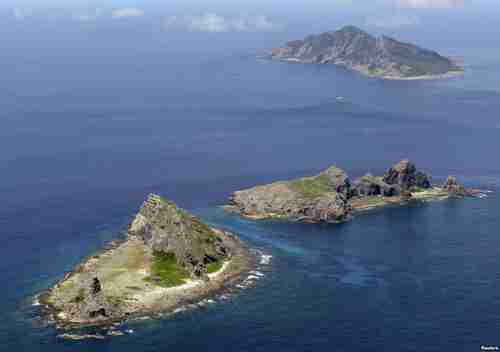 |
China has long trained for an amphibious invasion of Taiwan during military exercises but has now expanded its training to include a similar attack on the Senkaku Islands and other Japanese holdings in the East China Sea. All branches of China's People's Liberation Army (PLA) participated in a massive exercise last year for taking these islands.
According to James Fanell, Deputy Chief of Staff for Intelligence and Information Operations, U.S. Pacific Fleet:
"We witnessed the massive amphibious and cross military region enterprise — Mission Action 2013. [We] concluded that the PLA has been given the new task to be able to conduct a short sharp war to destroy Japanese forces in the East China Sea following with what can only be expected a seizure of the Senkakus or even a southern Ryukyu [islands] — as some of their academics say. ...Tensions in the South and East China Seas have deteriorated with the Chinese Coast Guard playing the role of antagonist, harassing China’s neighbors while PLA Navy ships, their protectors, (make) port calls throughout the region promising friendship and cooperation."
This concept of a "short, sharp attack" is quite credible, as the Chinese people widely believe that America has become weak because of the Iraq and Afghanistan wars, and that, particularly under President Barack Obama, Americans have little will to oppose China. Thus, they could quickly overwhelm Japan's forces, America would do nothing, and Chinese ownership of the Japanese islands would be part of the new status quo.
History has shown that this is a disastrous assumption.
In April, 1861, the army of America's southern Confederacy captured Fort Sumter in a "short, sharp attack." Undoubtedly, many Southern officials believed that the North wouldn't even care, since the Fort was isolated in Southern territory. And yet the North did care, triggering the extremely bloody American Civil War.
In 1939, the Nazis launched a "short, sharp attack" on Poland. They thought that Britain was weak and uninterested, since they'd already ignored an earlier short, sharp attacks on Austria and Czechoslovakia. The attack on Poland triggered World War II.
So, one can imagine that the Chinese believe that a short, sharp attack on these Japanese islands would bring no American response, like the Nazi attack on Czechoslovakia. Even if that turns out to be true, history shows that American nationalism would surge so high that any further military action by China would trigger a response, spiraling into a new world war.
The Pentagon has issued a statement saying that they expect to have peace in our time, responding to Fanell's assessment as follows:
"What I can tell you about what Secretary Hagel believes is that we all continue to believe that the peaceful prosperous rise of China is a good thing for the region, for the world. We continue to want to improve our bilateral military relations with China and that we also think that a major component of that is increased transparency on their part about the investments they're making and the operations they're conducting, and that's where I leave it."
United States Naval Institute and Voice of America
People ask me this question all the time: If a war with China ever happens, how and when would it start?
Of course, answering that question would require a mind-reading capability, but history tells us a lot about how such a war would start and unfold.
Looking at World War II, we have two different examples to examine. The war in Europe began with Germany's "short, sharp attack" on Czechoslovakia, and so China's attack on the Senkakus may trigger a war. Or, we can look at the Pacific war that began with an all-out attack by the Japanese, and so the war may begin with a massive missile attack by the Chinese on America's aircraft carriers, cities, and military installations.
No matter what the scenario, history tells us that the Chinese population would greet such a war with jubilation.
Here's how historian Wolfgang Schivelbusch describes how war begins in his 2001 book, The Culture of Defeat: On National Trauma, Mourning, and Recovery:
"The passions excited in the national psyche by the onset of war show how deeply invested the masses now were in its potential outcome. Propaganda had reinforced their conviction that "everything was at stake," and the threat of death and defeat functioned like a tightly coiled spring, further heightening the tension. The almost festive jubilation that accompanied the declarations of war in Charleston in 1861, Paris in 1870, and the capitals of the major European powers in 1914 [American Civil War, Paris Commune, and World War I, respectively] were anticipatory celebrations of victory -- since nations are as incapable of imagining their own defeat as individuals are of conceiving their own death. The new desire to humiliate the enemy, noted by Burckhardt, was merely a reaction to the unprecedented posturing in which nations now engaged when declaring war.The deployment of armies on the battlefield is the classic manifestation of collective self-confidence. If both sides are not convinced of their military superiority, there will be no confrontation; rather, those who lack confidence will simply flee the field. Accordingly, the battle is decided the moment the confidence of one side fails. The will to fight ("morale") evaporates, the military formation collapses, and the army seeks salvation in flight or, if it is lucky, in organized retreat. The Greek term for this point in space (on the battlefield) and time (the course of the battle) was trope. The victors demarcated the spot with the weapons of the vanquished and later with monuments, yielding the term tropaion, from which we get our word trophy." (p. 6-7)
The euphoria goes on until something goes wrong, as has happened to Americans since 2003, even though we've never had any really major military disasters in Iraq.
The panicked reaction can be much greater when a military disaster occurs. In his 1832 book, On War, General Carl von Clausewitz describes what happens:
"The effect of defeat outside the army -- on the people and on the government -- is a sudden collapse of the wildest expectations, and total destruction of self-confidence. The destruction of these feelings creates a vacuum, and that vacuum gets filled by a fear that grows corrosively, leading to total paralysis. It's a blow to the whole nervous system of the losing side, as if caused by an electric charge. This effect may appear to a greater or lesser degree, but it's never completely missing. Then, instead of rushing to repair the misfortune with a spirit of determination, everyone fears that his efforts will be futile; or he does nothing, leaving everything to Fate."
From the point of view of Generational Dynamics, the events that cause this "sudden collapse" and "total destruction" of self-confidence are called "regeneracy events," because they regenerate civic unity for the first time since the end of the preceding crisis war.
In other words, once the euphoria of war with China is destroyed (and this will be true of both the American and Chinese side), the conflict begins to turn into an all-out generational crisis war, where no the life of no individual human being will have any value at all, and the only thing that matters is survival of the nation and its way of life.
Once again, we can look to World War II for examples. The Allies allowed tens of thousands of young American soldiers to be shot down like fish in a barrel on the beaches of Normandy, they firebombed Dresden and Tokyo, and they used nuclear weapons on two Japanese cities. This is what ALWAYS happens at the climax of a crisis war, even by the most benevolent of belligerents. General Carl von Clausewitz, On War
For years I've been referring to China's media reports bragging about new missile systems of the People's Liberation Army (PLA) specifically designed -- with no other purpose -- than to overwhelm American missile defenses and strike American aircraft carriers, American military installations, and American cities. America's vulnerability has been substantially weakened in recent years by defense cutbacks, and by the massive release of secret information by Edward Snowden, which may have left America's defenses completely exposed.
In a separate presentation, in addition to the one described above, intelligence chief James Fanell describes China's actions in the South China Sea by the People's Liberation Army Navy (PLAN):
"Suffice it to say that my assessment is that the PLA Navy has become a very capable fighting force. Much of the intelligence record is classified beyond what we can discuss in this forum, but just to give you one example, in 2012, the PLA Navy sent seven surface actions groups and the largest number of its submarines on deployment into the Philippine Sea in its history – and a significant increase in some areas from the years before, or just the year before.Make no mistake, the PLA Navy is focused on war at sea and about sinking an opposing fleet.
The PLA Navy’s civil proxy, an organization called “China Marine Surveillance,” has escalated a focused campaign since 2008 to gain Chinese control of the near seas, and they now regularly challenge the exclusive economic zone resource rights that South Korea, Japan, the Philippines, Malaysia, Brunei, Indonesia, and Vietnam once thought were guaranteed to them by the United Nations Convention on the Law of the Sea. ... China is negotiating for control of other nations’ resources off their coasts. “What’s mine is mine, and we’ll negotiate what’s yours.” ...
Incidentally, unlike U.S. coast guard cutters, Chinese marine surveillance cutters have no other mission but to harass other nations into submitting to China’s expansive claims. Mundane maritime government tasks like search-and-rescue, regulating fisheries, ice breaking and criminal law enforcement are handled by other agencies. ...
In my opinion, China is knowingly, operationally and incrementally seizing maritime rights of its neighbors under the rubric of a maritime history that is not only contested in the international community, but has largely been fabricated by Chinese government propaganda bureaus in order to quote-unquote “educate” the populace about China’s “rich maritime history” clearly as a tool to help sustain the Party’s control.
Last year’s Scarborough Shoals seizure typifies the confrontations that China is having with its neighbors. It’s one that exhibited all the common characteristics of China’s aggression. First, they are initiated by the egregious conduct of China’s actors – sometimes the Chinese government, sometimes private entities. At Scarborough Reef, Chinese fishermen were excavating live coral and harvesting endangered species, including giant clams.
Second, Chinese official spokesmen will issue fabricated stories to explain the incidents; in the case of Scarborough, the Ministry of Foreign Affairs spokesman said the “Chinese fishermen were seeking refuge from storms.”
Simply not true. You can Google the weather that day: winds 5-10 knots, seas less than two feet, sunny, there were no thunderstorms."
Fanell is confirming the Chinese strategy that we've been describing for years. China's seizure of the Scarborough Shoal from the Philippines in 2012 is similar to reports of plans for China's military to seize one island after another in the South China Sea. ( "16-Jan-14 World View -- China threatens military seizure of South China Sea island from Philippines") China is counting on the fact that any "short, sharp attack" on any one island won't bring an American response.
As we've said before, it's impossible to predict the timing of all this, but there's no possible way to interpret China's actions except as massive preparations for preemptory war with the United States, and the analysis by intelligence chief Fanell confirms that.
OK, Dear Readers, please resume your regular activities of spending all your time arguing with one another about whether the world will end in 2100 because of Global Warming. China Business Intelligence
(Comments: For reader comments, questions and discussion, see the 21-Feb-14 World View -- U.S. naval intelligence chief confirms worst fears of China's military buildup thread of the Generational Dynamics forum. Comments may be
posted anonymously.)
(21-Feb-2014)
Permanent Link
Receive daily World View columns by e-mail
Donate to Generational Dynamics via PayPal
George Soros bets that Wall Street is headed for a fall
This morning's key headlines from GenerationalDynamics.com
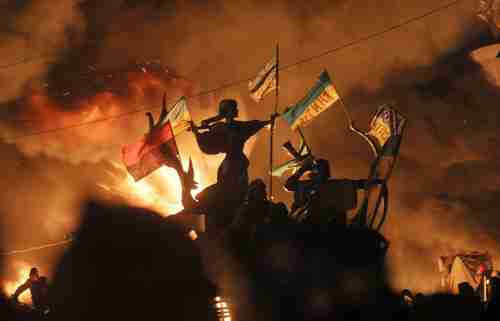 |
Fears of civil war in Ukraine increased on Wednesday when president Viktor Yanukovych fired Colonel-General Volodymyr Zamana, the chief of the army, on the bloodiest day of protests in Kiev so far, with 26 people killed in clashes between protesters and police. This is at a time when the government in Kiev is losing control of much of the western part of Ukraine.
For the army chief to be fired during the middle of a major government crisis has led to speculation that Zamana had refused a direct order to use force on civilians. It's also possible that his replacement, naval commander Admiral Yuriy Ilyin, will be asked to take back control of western Ukraine.
Speaking on the BBC World Service, Reuben F. Johnson, Kiev correspondent for Jane's Defence Weekly, made the following comments (my transcription):
"It's almost certainly because the president is looking for a military leader who when given an order to use the armed forces against the public will follow that order. ...We've already heard reports from more than two weeks ago from western parts of Ukraine basically saying, if people show up, if troops show up on the president's orders from another part of Ukraine, then our troops and our police will fight them. It will be civil war. There'll be violence without a doubt. It's headed for civil conflict on a very big scale."
Late in the day, Yanukovych announced that he'd reached a truce agreement with the opposition to end the violence, but he's announced such agreements before. BBC and AFP(1/24)
The string of terrorist attacks specifically targeting Hezbollah and Iranian assets in Lebanon continued on Wednesday, when two suicide car bombs targeted an Iranian cultural center in Beirut, killing six people and wounding 80 others.
The string of terrorist attacks was triggered by the announcement, last April 30, by Hezbollah leader Sayyed Hasan Nasrallah gave a televised speech saying that Hezbollah would militarily enter the fight in Syria on the side of the regime of Syria's president Bashar al-Assad. Nasrallah reluctantly agreed to enter the Syrian war after being commanded to do so by his Iranian puppetmasters. ( "27-Sep-13 World View -- How Hezbollah's reluctant foray into Syria changed the Mideast")
The Al-Qaeda-linked Abdullah Azzam Brigades claimed credit for Wednesday's attack on Twitter:
"Your brothers in the Abdullah Azzam Brigades, Ali Hussein Bin Ali brigades, claim the raid of the Iranian Cultural Center and it is a twin suicide bombing. It is in response to Iran's party [Hezbollah] fighting alongside the criminal regime in Syria, and the continued detention of Muslim youth in Lebanese prisons. ...We will continue... to target Iran and its party in Lebanon, in its security and political and military centres, until our demands are achieved. First: that the Party of Iran (Hezbollah) withdraws its forces from Syria. Second, that our prisoners are released from Lebanese prisons."
Nasrallah's announcement last year further inflamed Sunni versus Shia violence throughout the Mideast. He recently reaffirmed his decision for Hezbollah to continue fighting in Syria. Daily Star (Beirut) and AFP
According to SEC filings on Friday, George Soros has made a $1.3 billion bet that the S&P 500 stock index is headed for a sharp fall, by increasing his holdings of "put options on the S&P 500 ETF SPY," which increase in value when the S&P 500 falls. (Paragraph corrected. 20-Feb)
Even the most Pollyannaish financial experts have been anticipating a 10-20% stock market correction for over a year now, saying that the market the had to regroup before it could rise to new heights. But the experts have been repeatedly wrong, and there's been no correction. But now apparently Soros is so certain that a correction is coming that he's bet a lot of money on it. Market Watch
(Comments: For reader comments, questions and discussion, see the 20-Feb-14 World View -- Ukraine's president fires the chief of the army amid protest crisis thread of the Generational Dynamics forum. Comments may be
posted anonymously.)
(20-Feb-2014)
Permanent Link
Receive daily World View columns by e-mail
Donate to Generational Dynamics via PayPal
Thailand police storm protest camp in Bangkok, leaving four dead
This morning's key headlines from GenerationalDynamics.com
 |
In Ukraine, 18 people were killed and hundreds injured, both police officers and protesters, in bloody clashes on Tuesday between anti-government protesters in central Kiev, which they have been occupying for months. The protesters are demanding that pro-Russian President Viktor Yanukovych resign, and allow a pro-European government take its place. The protesters took an even more bitter political turn on Tuesday Russia's president Vladimir Putin provided a $2 billion loan to the President, to strengthen his political position.
The Kiev protests are a clash between two ethnic groups: The majority Ukrainian-speaking ethnic Ukrainians who occupy the western part of the country, outnumbering the Russian-speaking ethnic Russians living in the east. In the "Orange Revolution" of 2003, the same president Yanukovych was forced to step down from office, and was replaced in new elections by someone more agreeable to the ethnic Ukrainians. Yanukovych won reelection in 2010, and is now threatened by a new "Orange Revolution."
At the time of this writing on Tuesday evening ET, security police are charging protesters in central Kiev and meeting resistance. The clashes have been mostly confined to central Kiev so far, but there are growing fears that the fighting could spread, and turning into a full-fledged civil war -- which is not impossible, since Ukraine is in a generational Crisis era. AFP and LA Times
There is still a great deal of concern about what Russia is going to do if things don't go their way in Ukraine. It's widely believed that any military action by Russia in Ukraine is "on hold" for the duration of the Sochi Olympics, and the fears are of what Russia might do once the Olympics games have ended.
Russian nationalists are expressing a great deal of anxiety about the events in Ukraine, because they're afraid of similar anti-government protests in Russia. Aleksandr Samsonov, a well-known commentator, says that Russians should be under no illusions about the threat they face from the chaos that Ukraine is rapidly sinking into. He argues that what is going on threatens to return Europe to the situation of the 1930s, with the “rebirth” of Russophobic, fascist and neo-Nazi ideology” in Ukraine and its import into North Caucasian nationalists and jihadists. He says that Joseph Stalin was prepared and able to repulse these threats, but it is not clear that Russia could do so currently—or that Moscow even recognizes that “the union of liberals, national separatists, and Islamists is a terrible threat,” one that could lead to the spilling of “rivers of blood” in Russia. Russian society needs to be mobilized against this threat, he says. Jamestown
In Thailand, four people were killed and 64 injured, both police officers and protesters, when police tried on Tuesday to clear anti-government protesters from central Bangkok, which they have been occupying for months. The protesters are demanding that prime minister Yingluck Shinawatra resign, and allow the protesters to appoint an unelected "People's Council" that will rule in place of the elected government. The protesters took an even more bitter political turn on Tuesday as the country's anti-corruption commission filed charges against the Prime Minister.
The Bangkok protests are a clash between two ethnic groups: the "yellow shirt" market-dominant light-skinned Thai-Chinese elite minority, vastly outnumbered by the "red shirt" dark-skinned Thai-Thai who do most of the menial labor, and who continue to support the Yingluck's Pheu Thai political party. Because of the Thai-Thai majority, the Pheu Thai have won the last five elections and can continue to do so. That's why the elite Thai-Chinese anti-government protesters want to replace the elected government with their own People's Council that they can control.
The situations in Thailand and Ukraine appear to be similar, but from the point of view of Generational Dynamics they're very different. In particular, unlike Ukraine, Thailand is in a generational Awakening era, and so a civil war in Thailand is literally impossible, while it's quite possible in Ukraine. What happens during an Awakening era is that there are periods of conflict, like you see today in Thailand, alternating with "peace agreements" that never last. Each period of conflict is worse than the previous one, until a full-fledged civil war begins several decades later. So Thailand is nowhere close to a civil war, but Ukraine might be. CNN
(Comments: For reader comments, questions and discussion, see the 19-Feb-14 World View -- Ukraine chaos raising the worst anxieties among Russia's nationalists thread of the Generational Dynamics forum. Comments may be
posted anonymously.)
(19-Feb-2014)
Permanent Link
Receive daily World View columns by e-mail
Donate to Generational Dynamics via PayPal
United Nations accuses North Korea of 'unspeakable atrocities'
This morning's key headlines from GenerationalDynamics.com
 |
On September 18, Scotland will have a referendum on the question: "Should Scotland be an independent country?" If the vote is YES then nobody knows for sure what will happen next. During the last ten days, two major issues have arisen to threaten the viability of an "independent" Scotland:
In the worst case scenario, Scotland would be an independent entity completely on its own, like nearby Iceland and Norway.
If the UK continues to refuse a currency union with an independent Scotland, then Scotland will have three major choices:
Ten years ago, when talk of Scottish independence began, these choices seemed a lot easier. But since then, there's been a major financial crisis which has split southern countries like Greece and Italy versus the northern countries like France and Germany. Even seemingly solid Ireland has been in trouble. An independent Scotland, whether in the eurozone or a currency union with the UK, might just end up being another crisis.
It's not at all clear that an independent Scotland could become part of the European Union. Spain in particular is fighting its own internal battle with its Catalonia region seeking independence, and supporting Scotland might encourage Catalonia to fight harder for independence.
The English and the Scots are as different as Irish Protestants and Catholics, or as Sunni and Shia Syrians. Scotland and England have gone through a number of periods of unity and disunity for hundreds of years.
The Battle of Bannockburn, on June 24, 1314, was a great victory for Scottish forces against superior English forces. It was the climax of the First War of Scottish Independence, and established Scotland as an independent nation. Scotland and England fought against each other in a number of subsequent wars, including the War of the Roses (1459-87), and the Armada war with Spain (1588). The most explosive war that followed Scottish independence was the English Civil War (1640-49), that climaxed with the beheading of the English King in 1649. There followed a generational Recovery Era where Britain had no King, but was actually ruled by a military dictator, Oliver Cromwell, bringing Scotland under English control, until a new King was crowned in 1661. During the generational Awakening era in the 1660s and 1670s, Scotland began demonstrating against English control, culminating in the Awakening era climax, the so-called "Glorious Revolution" of 1689, making the Scottish Parliament independent once again. In 1701, the next generational Crisis war began, the War of the Spanish Succession, which allied Scotland and France against England. Miraculously, England defeated the French army in the Battle of Blenheim in 1704, and then again in the explosive and tumultuous climactic Battle of Malplaquet in 1709. After France's defeat at Blenheim, Scotland was finally brought to heel, and England and Scotland signed the "Acts of Union" between the two countries, under a single king or queen, forming the Kingdom of Great Britain in 1707.
It's now been 700 years since the Battle of Bannockburn, and the question of Scotland's independence is rising again. Polls indicate that the Scots themselves are slightly opposed to independence. BBC and Scotsman
 |
A United Nations panel has accused North Korea of crimes against humanity, including systematic extermination, torture, rape, forced abortions, starvation, arbitrary detention, executions and prison camps. The police and security forces of the Democratic People's Republic of Korea systematically employ violence and punishments that amount to gross human rights violations in order to create a climate of fear that pre-empts any challenge to the current system of government and to the ideology underpinning it. The institutions and officials involved are not held accountable.
The U.N. recommends prosecution of the country's top leaders by the International Criminal Court. This will never happen, of course, because China will veto any such attempt in the Security Council. BBC
Venezuela on Monday gave three U.S. diplomats 48 hours to leave the country, accusing them of conspiring against the government to incite large, violent anti-government protests.
Venezuela has the highest level of inflation in the world, 56%. There's a huge crime wave, but 90% of the cases are never solved. Despite its oil reserves, there are shortages of electricity. There are shortages of most everything else, even toothpaste and toilet paper. Last year, President Nicolás Maduro announced a new Vice-Ministry for the Supreme Social Happiness, whose purpose was to coordinate anti-poverty programs, but apparently it hasn't succeeded.
It seems likely that the disastrous economy is behind the new wave of anti-government protests, which have led to three deaths in clashes with police. Nonetheless, the Maduro's government blames the protests on the United States. According to Foreign Minister Elias Jaua:
"They have been visiting universities with the pretext of granting visas.But that is a cover for making contacts with (student) leaders to offer them training and financing to create youth groups that generate violence."
In November, Maduro accused the United States of orchestrating a "massive attack" against the Twitter accounts "of Bolivarian patriots and Venezuelan Chavistas." The word Bolivarian alludes to Simón Bolivar, the 19th century founder of Venezuela. The word "Chavista" alludes to Maduro's late predecessor, Hugo Chávez. When Chávez was dying of cancer, he accused the United States of giving him cancer by poisoning him. Reuters and Latin American Herald Tribune
(Comments: For reader comments, questions and discussion, see the 18-Feb-14 World View -- Scotland faces reality as independence referendum approaches thread of the Generational Dynamics forum. Comments may be
posted anonymously.)
(18-Feb-2014)
Permanent Link
Receive daily World View columns by e-mail
Donate to Generational Dynamics via PayPal
The 'New Frugality' versus the 'New Criminality'
This morning's key headlines from GenerationalDynamics.com
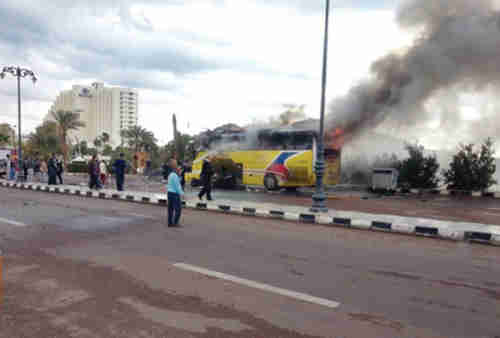 |
A terrorist bomb exploded on a bus carrying 33 tourists in Egypt on Sunday. The explosion killed the Egyptian bus driver and three South Korean tourists. The attack took place in the Red Sea resort town of Taba, in south Sinai, just before the bus was about to cross over into Israel.
No one has yet claimed credit for the attack, but it's suspected that the perpetrators are the al-Qaeda linked Sinai terrorist group Ansar Jerusalem (Ansar Bayt al Maqdis or Champions of Jerusalem), which has claimed credit for several major terrorist bombings in the past.
Terrorist attacks have been increasing since the army coup that ousted president Mohamed Morsi on July 3 of last year, with Ansar Jerusalem claiming credit for many of them, but up till now the targets have been security targets and personnel. This is the first terrorist attack since 2008 on tourists. Tourist visits to Red Sea resorts are an important source of income for Egypt, and it's feared that Sunday's attack begins a new escalation designed to destroy Egypt's economy. Al-Ahram (Cairo) and Reuters
Neil Howe who, along with the late William Strauss, founded generational theory in the 1980s, says in Forbes that analysts in the national media are wrong to blame the decline in labor force participation on the aging population, since the Boomer generation is actually increasing its labor force participation, and is the only generation currently to be doing so.
He suggests another explanation: That Generation-X has a new social mood, an enduring "New Frugality," of spending less, working less, and buying cheaper. According to Howe:
"Xers also prefer to do things for themselves. They don’t trust others to get the job done right and consider paying others for services they could perform themselves inefficient. Why buy something new when you could employ crafty DIY tactics for half the price? Why pay nannies to look after your kids while you work to be able to afford their services? And why work law firm hours at today’s high marginal tax rates, when you’ll just have to give more of your money back?"
He adds that since mainstream analysts' assumptions are wrong, their conclusions are wrong as well:
"Pundits keep offering theories about when America will return to pre-recession spending, GDP growth, and employment rates. But if Xers continue to work and spend according to a New Frugality ethos, these milestones will remain elusive."
Howe's point is that, because of generational factors, the global financial crisis is far from over, and the economic growth that politicians are counting on is not going to happen. This is a point that I too have been making for years, and it's backed up by the Velocity of Money chart that I posted last month:
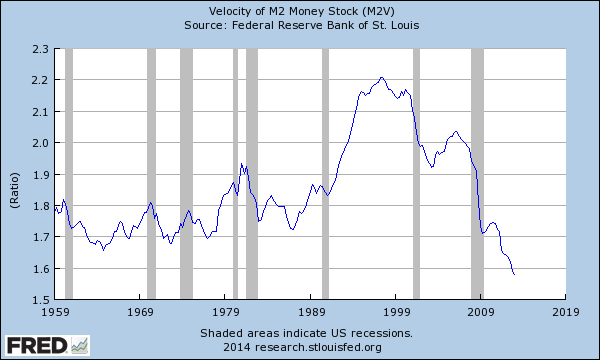 |
The velocity of money has been cratering since the financial crisis began in 2007, and it means that people aren't spending money. This is propelling the economy into a deflationary spiral.
However, there's another side to the "New Frugality," and that's the "New Criminality."
It's easy to forget how much criminality there's been in the last decade, since the Gen-Xers came to power. There was the creation and sale of trillions of dollars in fraudulent mortgage-backed securities by thousands of bankers -- not a single one of which has gone to jail.
Analysts on CNBC lie constantly about stock valuations. There isn't even a pause any more. The lying is just part of the culture. That's criminal activity if anyone cared. (See, for example, "14-Apr-12 World View -- Wharton School's Jeremy Siegel is lying about stock valuations" from last year.)
Then there's the Gen-Xer-in-chief in Washington. Does anyone, even his supporters, believe a word he says any more? And it doesn't matter. As I've said, if President Obama picked up a gun and shot and killed Michele, then the NY Times and NBC News would blame it on the Republicans.
Probably nothing is worse right now than Obamacare. Each day, it destroys another part of the economy, just as Bashar al-Assad's barrel bombs destroy innocent people's neighborhoods in Syria. But it doesn't matter to Obama.
This is the standard Nomad archetype/Generation-X nihilistic paradigm: Destroy everything so that you can start over with a blank slate, also sometimes stated as "You have to break a few eggs to make an omelet." The Gen-Xer-in-chief believes that if enough of the medical insurance industry is destroyed, then Obamacare will survive, and his name will go down in history for government medical insurance. (See "The nihilism and self-destructiveness of Generation X" from 2008.)
All of these are examples of massive criminality that's been going on in the past decade, which would have been completely unthinkable a decade earlier, when the people of the Silent generation were in charge.
The "New Criminality" is the mirror image of Howe's "New Frugality." If CNBC analysts lie with impunity about stock valuations, and Obama lies with impunity about Obamacare, then it's impossible to trust anyone, and you have to do everything for yourself, which is what Howe says about Gen-Xers. I know that's the way I feel, and I'm not a Gen-Xer. Forbes
(Comments: For reader comments, questions and discussion, see the 17-Feb-14 World View -- Egypt's terrorism escalates with attack on tourist bus thread of the Generational Dynamics forum. Comments may be
posted anonymously.)
(17-Feb-2014)
Permanent Link
Receive daily World View columns by e-mail
Donate to Generational Dynamics via PayPal
Indonesia on the alert for jihadists returning from Syria
This morning's key headlines from GenerationalDynamics.com
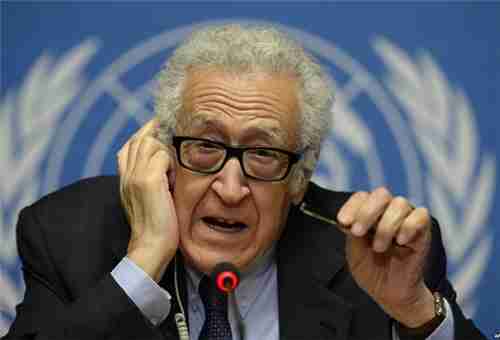 |
It's not a surprise to anyone, but the Syria "Geneva II peace talks" officially collapsed on Saturday, with no date set for future "peace talks."
United Nations envoy Lakhdar Brahimi uncharacteristically assigned blame for the collapse, apparently to the Syrian regime of Bashar al-Assad. He seemed close to tears as he announced:
"I'm very very sorry and I apologize to the Syrian people -- that their hopes which were very very high, that something will happen here -- I think that the little that has been achieved in Homs gave them even more hope. ... I apologize to them that these two rounds have not helped them very much. ...Unfortunately, the government have refused, which raises the suspicion of the opposition that in fact the government doesn't want to discuss peace at all. ...
My message to those who are concerned in the crisis in Syria to think of the Syrian people and their huge suffering which was imposed on them."
The two sides were unable to agree to an agenda for continuing the talks. The earlier peace talks in Geneva in June 2012, and now called "Geneva I," called for an end to the Syrian civil war by the resignation of president Bashar al-Assad, and instituting a new transitional governing body with members from the former al-Assad government, as well as members from the opposition.
The al-Assad regime wanted no part of that discussion, but only wants to discuss "terrorism," referring to the jihadists in Syria. So Brahimi came up with a kind of compromise: The Geneva II peace talks would discuss "terrorism" on day 1, then discuss the "transitional governing body" on day 2, and alternate between the two topics on subsequent days.
Well, the al-Assad regime refused to even discuss the "transitional government body," and his spokesman said that the terrorism problem has to be completely solved and agreed by all sides "with a common vision," before any other topic could be even discussed. According to reporters, the opposition were willing to be flexible and discuss all issues, but the al-Assad regime refused to discuss anything but their chosen topic. This is what led to Brahimi's statement, "Unfortunately, the government have refused, which raises the suspicion of the opposition that in fact the government doesn't want to discuss peace at all."
According to Brahimi, a third round of talks was planned, but no date was set. The agenda for the third round will be:
The farcical nature of the "Geneva II peace conference," and its inevitable collapse, while Syria's genocidal monster president Bashar al-Assad continues to drop barrel bombs on innocent women and children, is causing renewed debate in Washington over military action in Syria.
The parameters of this debate are as follows:
If a U.S. missile attack on Syria is approved, then the choice of targets would be as follows, according to Joint Chiefs of Staff Chairman Gen. Martin Dempsey:
As we've been saying repeatedly for months, the war crimes being committed by Syria's president Bashar al-Assad, and by Russia's president Vladimir Putin for supplying weapons to al-Assad, have made Syria the magnet for jihadists from countries around the world.
In Indonesia, the terrorist group Jemaah Islamiyah (JI) was responsible for the horrendous Bali bombings in 2002, but in recent years, JI has become ineffectual. Now it's believed that dozens of fighters have gone to Syria for training and experience, and now are returning. "The danger remains that fighters returning from Syria could infuse new energy into Indonesia's weak and ineffectual jihadi movement," according to an Indonesian report. Central Asia Online
(Comments: For reader comments, questions and discussion, see the 16-Feb-14 World View -- Syria talks collapse, putting U.S. military action back on table thread of the Generational Dynamics forum. Comments may be
posted anonymously.)
(16-Feb-2014)
Permanent Link
Receive daily World View columns by e-mail
Donate to Generational Dynamics via PayPal
France sending more troops to Central African Republic
This morning's key headlines from GenerationalDynamics.com
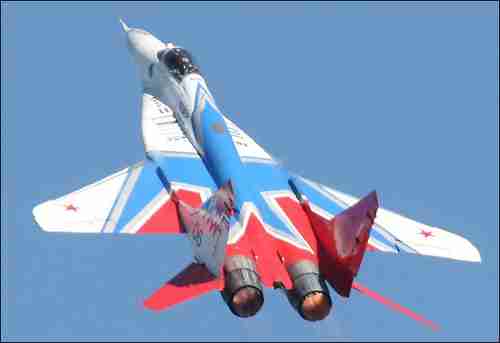 |
Russia will sell $3 billion in weapons systems to Egypt, after an agreement was reached during a visit to Moscow by Egypt's defense minister and likely new president Field Marshal Abdel al-Fattah al-Sisi. The weapons include MiG-29M/M2 Fulcrum fighter jets, air defense missile complexes, Mi-35 helicopters, coastal anti-ship complexes, light weapons and ammunition.
Russia was Egypt's main arms supplier in the 1960s and early 1970s. Egypt is returning to Russia now, because of military aid cutbacks by the United States following the military coup that ousted president Mohamed Morsi and his Muslim Brotherhood government. Ria Novosti and Al Ahram (Cairo)
Pakistan announced that it plans to sell JF-17 Thunder combat jets and other aircraft and equipment to Saudi Arabia. The JF-17 was developed jointly by China and Pakistan. This announcement comes days after reports that Saudi Arabia is asking Pakistan to send 30,000 troops to Saudi Arabia". Pakistan and Saudi Arabia are signing defense cooperation agreements because of the rise of Iran.
Saudi Arabia is also very concerned that Iran is developing a nuclear weapon, and some reports are suggesting that Pakistan is also planning to sell nuclear weapons technology to the Saudis. However, Pakistan's foreign minister is denying this:
"We have a nuclear weapons program which is a declared one. We have extensive security regimes. Our civilian nuclear program is under the [International Atomic Energy Agency] safeguards and it is meant to provide energy and it is also used in agriculture and medical fields.The IAEA and other organizations have listed Pakistan as a model country with regard to the security mechanisms that we have in place."
Saudi Arabia is thought to be turning to Pakistan because its relationship with the United States has been souring. The News (Pakistan) and Indian Express
France said on Friday that it plans to send 400 additional peacekeeping troops to the Central African Republic (CAR), making a total deployment of 2,000 troops, working with the African Union force of 6,000 peacekeepers. The troops are being sent because a wave of "ethnic-religious cleansing" and "mass atrocities" loom over CAR. The mass atrocities are being committed by Christian tribes in retaliation for last year's attacks on Christians by Muslim Seleka militias. ( "8-Feb-14 World View -- Central African Republic: Christians aim to get rid of all Muslims")
From the point of view of Generational Dynamics, the CAR conflict is spiral into a full-scale generational crisis war, despite increasingly desperate international efforts to prevent it. CAR's last generational crisis war was the 1928-1931 Kongo-Wara Rebellion ("War of the Hoe Handle"), which was a very long time ago, putting CAR deep into a generational Crisis era, where a new crisis war is increasingly likely. CAR is geographically the size of Texas, with over 5 million people, and so 400 additional troops will make no difference whatsoever. Reuters
(Comments: For reader comments, questions and discussion, see the 15-Feb-14 World View -- Pakistan will sell warplanes to Saudis, denies nuclear cooperation thread of the Generational Dynamics forum. Comments may be
posted anonymously.)
(15-Feb-2014)
Permanent Link
Receive daily World View columns by e-mail
Donate to Generational Dynamics via PayPal
Welcome to the Valentine's Day edition of Generational Dynamics World view
This morning's key headlines from GenerationalDynamics.com
Welcome to the Valentine's Day edition of Generational Dynamics World View!
 |
A Shanghai male named "UP" who broke up with his girlfriend last year and who describes himself as a "computer nerd" has found a unique way to ruin Valentine's Day for numerous other couples in Shanghai. Any couple wanting to go to the cinema to see the popular movie Beijing Love Story will have to split up. Using crowdfunding, "UP" collected enough money from "brilliant, bitter singles" to purchase tickets to all the odd-numbered seats in the theatre, so that any lovers wanting to see the movie will have to sit at least one seat apart from each other. According to an online posting by "UP":
"Want to see a movie on Valentine’s Day? Sorry, you’ll have to sit separately. Absence makes the heart grow fonder. Give us singles a chance."
Beijing Love Story is a movie based on a hit TV series. The plot of the movie is told through the eyes of five couples; Two teenagers meet and find purest puppy love; A young couple are convinced they are soul mates after making eye contact for the first time; A middle aged couple are torn apart when the husband repeatedly cheats on his wife; A couple who have been married for decades try to spice up their marriage by playing special games; And a grandmother tries to find another woman to take care of her husband after discovering she has a terminal illness.
This is not the first time that young Chinese have rebelled against Valentine's Day. In the 1990s, they created "Singles Day," to be celebrated each year on November 11 (11/11) because of the four 1's in the date. There was a particularly big Singles Day celebration in 2011 on 11/11/11. Shanghaiist and Global Times (Beijing)
Greece's unemployment rate rose further to a new record high of 28% in November, according to the country's statistics agency ELSTAT (Hellenic Statistical Authority). Youth unemployment also reached a record high rate of 61.4%. Economists expect things to get worse in the early part of this year as companies continue to restructure and fire workers. Greek Reporter
The European Union is looking for ways to fund long-term investments, including bailout loans, by "mobilizing" private savings, which presumably means that private savings would be confiscated, as happened in the bailout of Cyprus last year. Also under consideration is a voluntary EU savings account, where investors could pool their money for investment in small companies. (The Obama administration has proposed a similar plan known as "MyRA".)
This approach is being increasingly discussed. In a publication by the International Monetary Fund (IMF) in October of last year, the following appears on page 49 of the report "Taxing Times":
"The sharp deterioration of the public finances in many countries has revived interest in a "capital levy" -- a one-off tax on private wealth -- as an exceptional measure to restore debt sustainability. The appeal is that such a tax, if it is implemented before avoidance is possible and there is a belief that it will never be repeated, does not distort behavior (and may be seen by some as fair). There have been illustrious supporters, including Pigou, Ricardo, Schumpeter, and -- until he changed his mind -- Keynes. The conditions for success are strong, but also need to be weighed against the risks of the alternatives, which include repudiating public debt or inflating it away (these, in turn, are a particular form of wealth tax -- on bondholders -- that also falls on nonresidents).There is a surprisingly large amount of experience to draw on, as such levies were widely adopted in Europe after World War I and in Germany and Japan after World War II. Reviewed in Eichengreen (1990), this experience suggests that more notable than any loss of credibility was a simple failure to achieve debt reduction, largely because the delay in introduction gave space for extensive avoidance and capital flight -- in turn spurring inflation. The tax rates needed to bring down public debt to precrisis levels, moreover, are sizable: reducing debt ratios to end-2007 levels would require (for a sample of 15 euro area countries) a tax rate of about 10 percent on households with positive net wealth."
In other words, confiscating people's assets and savings is most effective when it's a complete surprise, so that people can't practice "extensive avoidance and capital flight." Reuters and Zero Hedge and International Monetary Fund (PDF)
 |
2,500 South Korean couples will be able to spend Valentine's Day in marital bliss, thanks to a mass wedding held on Wednesday by the Unification Church, founded by the late Sun Myung Moon. The mass weddings began in the 1960s with only a few couples, but they reached a peak in 1997 with 30,000 couples. Many of the couples met only a few hours before the wedding, having been personally matched by Sun Myung Moon or, since his death, by his widow. However, marriage won't be TOO blissful on Valentine's Day, since the couple must promise to refrain from sexual relations for at least 40 days after marriage.
South Korea isn't the only country holding mass weddings. In Pakistan, a charitable organization donated dowries to 70 poor young women in Punjab, allowing them all to finally get married in a mass wedding. In Nigeria, a mass wedding program was launched in 2012 to enforce Islamic law by helping single people pair up. The Nigerian government provides each bride with a dowry and utensils. AFP and Global Post
(Comments: For reader comments, questions and discussion, see the 14-Feb-14 World View -- European Union to 'mobilize' private savings for bailouts thread of the Generational Dynamics forum. Comments may be
posted anonymously.)
(14-Feb-2014)
Permanent Link
Receive daily World View columns by e-mail
Donate to Generational Dynamics via PayPal
Turkey-Israel relations may be close to normalization
This morning's key headlines from GenerationalDynamics.com
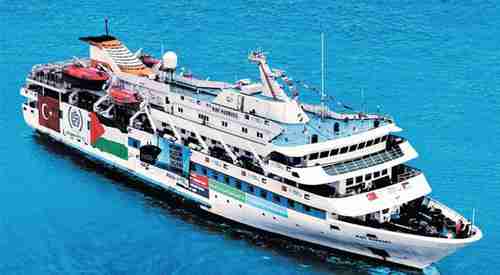 |
Turkey's foreign minister Ahmet Davutoglu said on Sunday that Israel and Turkey are the closest they've been to a normalization of relations in years. According to Davutoglu, there have been "positive developments":
"There has recently been a momentum and new approach in compensation talks. We could say that most of the differences have been removed recently in these discussions."
Turkey broke off diplomatic relations with Israel after the deaths of nine Turkish citizens on May 31, 2010, in a confrontation between Israel's navy and the boat Mavi Marmara in a flotilla headed for Gaza in violation of Israel's Gaza blockade. Since then, prime minister Recep Tayyip Erdogan has specified three conditions that Israel would have to fulfill, in order to restore normal relations. First, Israel would have to apologize, and Israel did so last March, under intense pressure for president Barack Obama.
Second, Israel would have to pay monetary compensation to the families of the victims. According to Davutoglu, negotiations have significantly reduced the difference in the amount between what Turkey demanded and Israel has offered. On Monday, it was reported that the Israeli government had decided that it would pay $20 million to the victims' families. In return, Turkey will agree to drop charges in its own courts against the IDF soldiers who participated in the raid on the Mavi Marmara.
Erdogan's third condition was the lifting of the blockade of Gaza. According to Davutoglu, Israel has "eased" the embargo on Gaza. On Tuesday, Erdogan renewed his condition, demanding that Israel provide a "written protocol" that they would end the Israeli "siege" on Gaza.
However, Israel's prime minister Benjamin Netanyahu on Wednesday confirmed that he has rejected Erdogan's demand to provide a written statement. It remains to be seen whether further negotiations will yield a compromise. Hurriyet (Turkey) and Israel National News
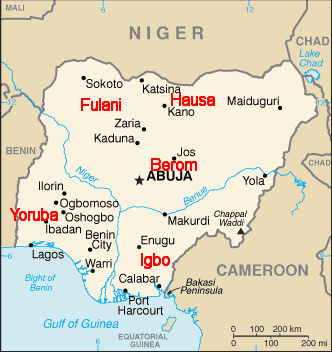 |
Gunmen from the al-Qaeda linked terrorist group Boko Haram ("Western education is forbidden") killed 51 people on Tuesday in an attack on a majority Muslim town in northeast Nigeria. Dozens of Boko Haram fighters speeding along in trucks painted in military colors and armed with automatic weapons and explosives the town, burning houses and shooting fleeing villagers. They also took 20 young girls from a local college as hostages.
This comes after two incidents last week. On Friday, terrorist gunmen in cars and on motorbikes burst into a Christian family's home and killed a family of seven. On the previous Sunday, 52 people were killed when gunmen stormed a church.
Prior to 2009, Boko Haram was a little known Muslim sect of ethnic Kanuri people. Starting in 2010, Boko Haram began a series of terrorist attacks across the country, often bombing Christian churches, saying their objective was to eliminate all Christians. In the last year, Boko Haram has announced the intention to establish an Islamist state in Nigeria's northeast. (Correction: "Hausa" changed to "Kanuri." 27-Feb)
The rise of Boko Haram from a terrorist group to a well-armed militia is another unintended consequence of the West's military intervention in Libya in 2011. The Libyan action provided a training ground for Islamist jihadists, including Boko Haram, and also provided vast stores of heavy weapons stolen from Muammar Gaddafi's unguarded storehouses.
There has been a resurgence of Boko Haram violence since the beginning of the year. Nigeria's Christian president Goodluck Jonathan has repeatedly promised that an army campaign would clean out the Boko Haram terrorists once and for all. However, those attempts have been stymied, reportedly because some politicians and army members support Boko Haram. Reuters and AFP
(Comments: For reader comments, questions and discussion, see the 13-Feb-14 World View -- Resurgence of Boko Haram terrorists in Nigeria thread of the Generational Dynamics forum. Comments may be
posted anonymously.)
(13-Feb-2014)
Permanent Link
Receive daily World View columns by e-mail
Donate to Generational Dynamics via PayPal
Slaughter by Syria's al-Assad and ISIL continues despite 'truce'
This morning's key headlines from GenerationalDynamics.com
 |
At a Washington press conference on Tuesday, held jointly with France's president François Hollande, president Barack Obama criticized businessmen who try to violate the sanctions against Iran. He was apparently referring to a delegation of 116 French businessmen, with representatives from major companies like Total, Lafarge and Peugeot, who visited Tehran last week in hopes of getting a big chunk of business with Iran when the sanctions are completely lifted.
According to President Obama:
"Businesses may be exploring -- are there some possibilities to get in sooner rather than later if and when there is an actual agreement to be had?But I can tell you that they do so at their own peril right now. Because we will come down on them like a ton of bricks."
Is this another "red line"? Does anyone believe anything President Obama says any more? Isn't this just so much hot air?
Hollande didn't seem to flustered. He said that he did not control French corporations, though had made clear sanctions on Iran would not be dismantled until a final deal on Iran's nuclear program had been reached. Expatica France
During the "peace talks" in Geneva last week, Syria's Bashar al-Assad regime killed some 1,900 people in one week, mostly with barrel bombs, which are barrels or canisters packed with explosives and metal, designed to flatten civilian neighborhoods and kill as many people as possible. So far in February, some 2,500 deaths have been documented, making it likely to be one of the deadliest months so far in the Syria war.
So it's somewhat laughable that the politicians and the media are calling it a great victory that al-Assad has agreed to a temporary truce and allow 1,000-2,000 civilians leave the wrecked city of Homs. Making up for that is just a few days work for the genocidal monster president of Syria, and for his puppetmasters in Moscow.
Meanwhile reports continue to surface, as they have for months, that the al-Assad regime and the ISIL (Islamic State in Iraq and the Levant) terrorists are either implicitly or explicitly cooperating together as allies to kill as many "moderate" opponents of the regime, as well as the al-Qaeda linked al-Nusra. So we have two terrorists -- "industrial strength" terrorist al-Assad, and "ordinary" terrorist group ISIL -- as allies in a war to gain control of western and eastern Syria, respectively. It seems likely that the whole "peace process" in Geneva is a big joke, and al-Assad is never going to agree to anything. Al-Arabiya and Al-Jazeera and Daily Star (Lebanon)
(Comments: For reader comments, questions and discussion, see the 12-Feb-14 World View -- Obama slams French businessmen in front of France's president thread of the Generational Dynamics forum. Comments may be
posted anonymously.)
(12-Feb-2014)
Permanent Link
Receive daily World View columns by e-mail
Donate to Generational Dynamics via PayPal
Korea's demilitarized zone (DMZ) guarded by Microsoft Kinect game software
This morning's key headlines from GenerationalDynamics.com
 |
South Korea's military is using Kinect, the motion-sensing software that Microsoft uses in its X-Box game controllers, to guard the 155-mile long demilitarized zone (DMZ) separating South and North Korea. The DMZ was established in 1954 as part of the armistice that ended the Korean war. It's called a "no-man's land," because it's heavily fortified with fences and landmines.
The Kinect technology was originally developed for Microsoft by Ko Jae-Kwan of Saewan Co., and the South Korean military is using it because it's better than any of the sensors they had previously been using. According to Ko:
"Existing sensors, which had been in place along the border, were highly efficient but could not tell the difference between humans and animals, sending wrong signals frequently."
The South Korean military has been embarrassed in the past by highly publicized incidents of undetected border crossings, including the case in 2012 when a defecting North Korean soldier simply walked undetected across the border and knocked on the door of a guard post. AFP
Reports out of Pakistan indicate that Saudi Arabia has asked Pakistan to dispatch 30,000 troops to the Kingdom as part of a bilateral defense agreement that's currently being formulated in a flurry of visits and meetings between defense and military officials from the two countries. Pakistan's prime minister Nawaz Sharif said:
"In view of current challenges, there is a need to further strengthen defense cooperation between the two countries and a new era of strategic relationship needs to start."
The particular "current challenges" facing Saudi Arabia and Pakistan are the rise of Iran, and Iran's rapprochement with the United States. Both countries fear that Iran will develop nuclear weapons and that, in the end, the West will do nothing to prevent it. Indeed, one of the jobs of the Pakistani troops will be military training for the Saudi army, a function that was formerly performed by American troops.
In 2008, Iran was our bitter enemy, and Saudi Arabia was our close ally. It was in 2008 that I first wrote, based on a Generational Dynamics analysis, that in the coming Clash of Civilizations world war, Iran would be allied with the West, while Saudi Arabia and Pakistan would be allied with China. (See "China 'betrays' Iran, as internal problems in both countries mount" from 2008.)
During the last six years, it's been very interesting to see how Saudi Arabia has moved away from the U.S., while Iran is moving closer to the U.S. The hardline survivors of Iran's 1979 Great Islamic Revolution have been retiring and dying, leaving behind younger generations that like the West, and have no particular animus against Israel. In Pakistan, on the other hand, the people are increasingly hostile to the United States and to India. MEMRI and The National (UAE)
Iran sees the growing accord between Saudi Arabia and Pakistan as a threat to Iran and to Shia Muslims in general, and uses the usual award-winning talking point of blaming the U.S. for everything to express its anger.
Iran itself has been targeted by al-Qaeda linked Jundullah (Soldiers of God), which has perpetrated major attacks on Shia mosques and Revolutionary Guard stations in southeastern Iran. Another al-Qaeda linked group, Lashkar-e-Jhangvi (LeJ), wants to exterminate all Shias and Hazaras in Pakistan. According to the head of a Shia political organization in Pakistan:
"Not one day passes without a martyr falling in Karachi, in Peshawar, in all Pakistani cities. If we have thirty days in a month, we have more than 100 martyrs every month. And they are being killed by the Saudi support. Saudi Arabia is supporting those who are behind these attacks."
Iran has developed a narrative that blames all terrorism in the Mideast on America's support for Afghan and Pakistani troops that were fighting against Russian troops in Afghanistan in the 1980s. According to Iranian analyst Dr. Ismail Salami, al-Qaeda is the "love child of terror" spawned by Saudi Arabia and America:
"Originally established by Washington in Afghanistan during the military occupation of the country by Soviet Union, it was called al-Qaeda, meaning 'base'. Soon, the group was expanded under the aegis of the CIA and Saudi-funded Pakistani intelligence agency (ISI) in order to oust the Soviet forces from the region and safeguard the interests of the US government.Following a secret long-term agenda, Washington recruited militants from different parts of the region including Afghanistan, Saudi Arabia, Pakistan, Jordan, Yemen and central Asian countries with the ultimate goal of disseminating and instilling an ideology of perversion in the name of Islam in the world. ...
In the final analysis, the center cannot hold and the Saudi-US lovechild of terrorism is running amuck and falling apart."
I have to say that's quite a fanciful narrative, though no more fanciful than some of the things you hear from the New York Times or NBC News. Ahlul Bayt News Agency (Iran) and Press TV (Iran)
(Comments: For reader comments, questions and discussion, see the 11-Feb-14 World View -- Pakistan asked to send 30,000 troops to Saudi Arabia thread of the Generational Dynamics forum. Comments may be
posted anonymously.)
(11-Feb-2014)
Permanent Link
Receive daily World View columns by e-mail
Donate to Generational Dynamics via PayPal
U.S. General criticizes Japan, Philippines for China-Nazi comparisons
This morning's key headlines from GenerationalDynamics.com
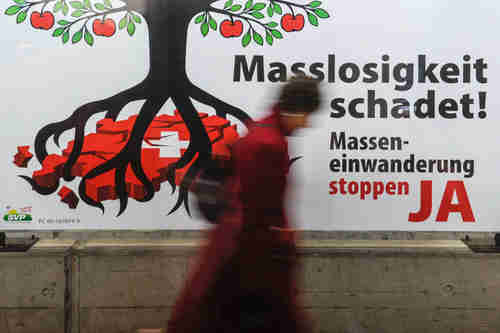 |
In a nationwide referendum on Sunday, Switzerland voted by a razor thin vote of 50.3% to re-impose quotas on immigrants from other countries, including EU countries. Switzerland is not a member of 17-nation eurozone bloc, nor is it a member of the 28-nation European Union, though it's surrounded by eurozone and EU countries. For 12 years, Switzerland's borders have been open to all EU countries (though not to other countries). The referendum was strongly opposed by the Swiss government. The greatest effect of implementation of Sunday's vote would be to close the borders to workers from the EU, many of them highly qualified.
The size of the vote varied across the country. Ticino is the only canton with an Italian language majority, and it voted 78% to curb immigration. Ticino borders Italy, and is having major social and economic problems from grossly underpaid foreigners, sometimes working as black market laborers. On the other hand, cantons in western Switzerland were strongly against limiting immigration, with 60-70% voting "no".
The "yes" vote threatens several agreements with the European Union, including trade agreements that permit most of Switzerland's exports to go to the EU. EU officials say that they're reviewing the situation to which of these agreements will have to be terminated. Swiss officials have three years to implement the new immigration quotas, and they've indicated that they plan to move very slowly. Geneva Lunch and Bloomberg
Some 30,000-50,000 anti-government activists rallied in Kiev on Sunday, the capital city of Ukraine, to demand the resignation of President Viktor Yanukovych, chanting:
"A new constitution. A new president. A new government. A new country. This is what we want and we will prevail. Glory to Ukraine."
Many wore blue and yellow ribbons, the colors of both Ukraine and the European Union, to emphasize their demands that Ukraine should be more closely linked to Europe than to Russia.
The Security Service of Ukraine (SBU) placed its anti-terrorist units on high alert, saying in a statement that it had received reports of terrorist incidents, including bomb threats at nuclear and hydroelectric power stations.
The government opposition warned that the country is headed for financial default. In the last month, the logic of bankruptcy has been reversed. Ukraine has been headed for bankruptcy for some time, but Russia's president Vladimir Putin offered to bail them out with a $15 billion loan, provided that they signed a trade agreement with his Eurasian Customs Union rather than the EU. However, as the riots and violence have grown, Putin announced that he would withhold the bailout money until Ukraine joins the customs union.
So now the opposition is saying that since Putin is withholding payment, the country is headed for default again. But opposition leader Arseniy Yatsenyuk says that the U.S. and the European Union are ready to step in with financial aid. Good to know. AFP and Ukrainian News Agency and Bloomberg
Gen. Herbert J. "Hawk" Carlisle, the commander of the Pacific Air Forces, is criticizing leaders of Japan and the Philippines for drawing comparisons between China's actions today and those of Nazi Germany prior to World War II. In these columns, I've repeatedly referred to China's current policies as being similar to Hitler's "Lebensraum" policies.
According to General Carlisle:
"The rise of Germany and what occurred between the U.K. in particular and Germany, and what happened in Europe, I don’t draw that comparison at all to what’s going on today [in the Asia-Pacific].Some of the things, in particular that have been done by Japan, they need to think hard about what is provocative to other nations."
Carlisle urged all countries in the region to try to defuse tensions. In particular, he cautioned China not to extend an air-defense identification zone (ADIZ) over the South China Sea as it did in the East China Sea separating China from Japan, because itoulw be "very provocative."
Several days ago, I quoted U.S. Assistant Secretary of State for East Asian and Pacific Affairs Daniel Russel as "Any Chinese claim to maritime rights not based on claimed land features would be inconsistent with international law." This statement turns out to be an official U.S. rejection of China's famous "nine-dash line map" claiming regions that have historically belonged to Vietnam, Brunei, Malaysia, Indonesia and the Philippines. According to Russel, any Chinese claims "must be derived from land features," and not from a historical map not recognized by anyone else. According to a China analyst formerly of the Obama administration:
"[F]or the first time, the United States government has come out publicly with an explicit statement that the so-called 'nine-dash line' ... is contrary to international law."
According to China's foreign ministry, "Some US officials make groundless accusations against China." Bloomberg and Radio Free Asia
(Comments: For reader comments, questions and discussion, see the 10-Feb-14 World View -- Switzerland votes to impose immigration quotas, violating EU agreements thread of the Generational Dynamics forum. Comments may be
posted anonymously.)
(10-Feb-2014)
Permanent Link
Receive daily World View columns by e-mail
Donate to Generational Dynamics via PayPal
Peaceful protests in Bosnia turn into widespread violence
This morning's key headlines from GenerationalDynamics.com
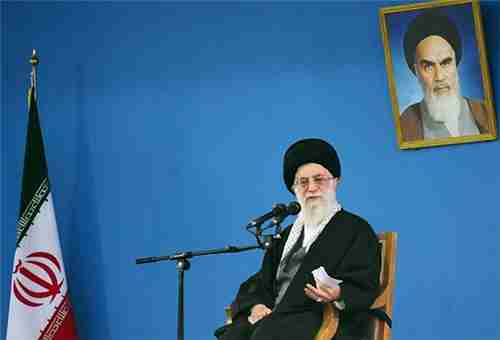 |
Now that the first of the sanctions have been lifted, and international investors are beginning to flock to Iran, Iran's supreme leader Ayatollah Seyed Ali Khamenei delivered an anti-American rant on Saturday to the Iranian Air Force commanders, accusing the Obama administration of lying:
"American officials, in negotiations with the country’s (Iran) officials, say we are not after regime change in Iran but they are lying because if they had the ability to do this they would not hesitate one second.The other reason behind US inability to change the Islamic establishment [of Iran] is that the establishment relies on the nation’s faith, kindness and resolve. One can change the tactics, but principles must remain rock solid."
The speech commemorated the 35th anniversary of the 1979 Great Islamic Revolution that brought Khamenei's predecessor, Ayatollah Rouhollah Khomeini, to power.
Khamenei's speech followed in incident on Friday, when the American delegation walked out of a speech in Tunisia at a ceremony honoring Tunisia's newly adopted constitution following the "Arab Spring." At the ceremony, Iran's parliamentary speaker Ali Larijani referred to Israel as a "cancer" in the region on Friday:
"Even after the revolutions that happened in the region, the US and Israel tried to divert and devastate some of the revolutions so that Israel can benefit."
Khamenei and Larijani are both survivors of Iran's 1979 Great Islamic Revolution which is being commemorated, and the great unifying theme of that revolution was that America was the Great Satan whose puppet, the Shah of Iran, had oppressed Iran's people for years. These aging leaders keep trying to revive the unity of the 1979 Revolution by claiming that America and Israel still want to defeat the revolution and oppress the Iranian people again.
Iran's younger generations don't share these views. Most of them like America and the West, and they don't particularly want to see Israel pushed into the sea. So 75-year-old Khamenei's fears about a regime change are well founded. His passing will trigger a generational Awakening era crisis that will cause big changes, including some kind of regime change. And as I've written many times, my expectation is that in the coming Clash of Civilizations world war, Iran will be the ally of America, Israel, Russia, India and others versus China, Pakistan, the Sunni Muslim countries, and others. Jerusalem Post and Ahlul Bayt News Agency (Iran)
Three days of anti-government protests in Bosnia led to violence across the country on Friday, when protesters set fire to government buildings and fought with riot police in Sarajevo and other cities. This was the worst civil unrest since the genocidal war in Bosnia-Herzegovina that followed the dissolution of the former Yugoslavia in 1992, killing 100,000 people and leading to a crisis war climax in 1995 with the Srebrenica massacre. (See "12-Jul-13 World View -- Bosnia commemorates the 1995 Srebrenica massacre".) Srebrenica is considered the worst genocide in post-war Europe. At least 8,300 Bosniak (Bosnian Muslim) men and boys who had sought safe haven at the U.N.-protected enclave at Srebrenica were killed by Orthodox Christian Serbs under the leadership of General Ratko Mladic, who coined the phrase "ethnic cleansing." Mladic is still considered a hero by many Serbs, who say that no crime was committed, as he was just defending Serbs. Ratko Mladic stands accused of committing war crimes, crimes against humanity and genocide.
Bosnia-Herzegovina is made up of two separate entities: a Bosniak-Croat Federation of Bosnia and Herzegovina, and the Bosnian Serb Republic, or Republika Srpska, each with its own president, government, parliament, police and other bodies. With 40% unemployment, there are around 550,000 unemployed people in Bosnia. There are widespread charges of corruption stemming from the deep divisions within the dual government framework.
People are expressing fears of a new civil war, like the one in 1992-95. However, from the point of view of Generational Dynamics, that's literally impossible. It's been 19 years since the climax of the Bosnian war, and so Bosnia is just entering a new Awakening era, as the young generation born after the war start protesting and making their views heard. However, their parents still remember that absolute horrors of the Bosnian war, and will do everything in their power to keep it from happening. It's worth noting that Friday's violence disappeared on Saturday, and the protests were almost all peaceful. BBC and AP and Reuters
(Comments: For reader comments, questions and discussion, see the 9-Feb-14 World View -- Iran's Ayatollah Khamanei rants and accuses the U.S. of lying thread of the Generational Dynamics forum. Comments may be
posted anonymously.)
(9-Feb-2014)
Permanent Link
Receive daily World View columns by e-mail
Donate to Generational Dynamics via PayPal
Reader complaints about Central African Republic and Syria
This morning's key headlines from GenerationalDynamics.com
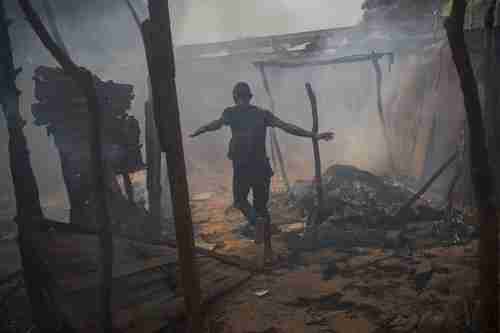 |
Thousands of Muslims are fleeing for their lives from Bangui, the capital city of Central African Republic, and from towns across the country. They're escaping in convoys being guarded by troops from Chad, a Muslim country.
The violence began after a March, 2013, coup that brought a Muslim to the presidency. Muslims formed "Seleka militias" and committed deadly attacks on Christians. Christians formed "anti-balaka" (or "anti-machete") militias, and began revenge attacks late in 2013. By now, the revenge attacks are in full force. According to one reporter:
"It's horrific, actually. You have a country that is essentially falling apart. Neighbor killing neighbor on a daily basis in the most brutal, horrific fashion I have ever seen. Lynchings, people attacked by mobs, people having their arms cut off, people burnt with tires around their necks like we saw in South Africa in the 1990s. ...I just saw today 10,000 Muslims forced to flee from Bangui and surrounding towns north toward Chad, because they are in fear for their lives. They are getting hacked to death, attacked in streets by mobs, the districts they live in and their houses and mosques are being looted and burned, so they have no choice but to leave. ...
But it's the most violent and hateful environment I've ever documented in 16 years. And I've covered every conflict in Africa over that time, but I've never documented anything this bad.
There is so much hatred. Yesterday I was in a town that had eight mosques and over 30,000 Muslims, but now the mosques have been burnt and there are only 300 Muslims left there, hiding in a mosque surrounded by French peacekeeping forces who are trying to keep them alive."
France has 1,600 peacekeeping troops in CAR, who are working with 4,000 African Union peacekeeping troops. The United Nations expects to send thousands more. But this is a generational crisis war, a force of nature, which can't be stopped by any number of troops until it's run its course. BBC and National Geographic
I'd like to address some reader complaints that have been addressed to me recently when I write about Central African Republic and about Syria's president Bashar al-Assad.
Bashar al-Assad is the worst genocidal monster so far this century, comparable to Mao, Hitler and Pol Pot of the last century. He's a Shia/Alawite Muslim who conducted "industrial strength" torture and extermination on his own civilians, who used sarin gas against his own people, who is allied with the Muslim terrorist group Hezbollah, and who is allied with Muslim Iran which some people call the worst terrorist country on earth.
And yet when I call al-Assad a "genocidal monster," I get bizarre complaints that I'm excusing al-Qaeda terrorism. That's ridiculous, as I write about al-Qaeda terrorism all the time, especially in Pakistan.
But what's most bizarre is that many of the people who make this complaint are in the community that perceive Muslims negatively, sometimes referring to all of them universally as "murderous." That's not true of more than a small minority, but if you really believe that all Muslims are "murderous," then you should be aware that al-Assad is the most murderous one of all.
So if you're one of those commenters who are holding those two contradictory views simultaneously, then I suggest you ask your doctor for anti-psychosis pills, because the cognitive dissonance is going to drive you crazy.
This is actually very familiar. College kids in the 1960s praised Mao Zedong as a god, even carrying copies of his "Little Red Book" in their back pockets, and quoting from it from time to time. This was going on at the same time that Mao was starving, torturing and executing tens of millions of Chinese people in the Great Leap Forward, and then again the Cultural Revolution.
There are still people today who consider Mao to be a god, and they still praise him to the skies. And we all know that there are Holocaust deniers who says that the evidence of the Holocaust was all manufactured. These are all the same to me as lovers of al-Assad.
The situation in Central African Republic is drawing a number of complaints because there are Christians committing atrocities on Muslims. One accusation is that I'm excusing the atrocities of Muslims, which is absurd.
I will agree with the commenters to the following extent: Large-scale Christian atrocities are so rare at this time in history that there is increased focus on the one in CAR, while there are so many Muslim jihadist atrocities that any individual situation is not a major story.
Another complaint was related to my contrast of the CAR war versus the Syria war, when I said that the violence in CAR was more personal.
Let's go back to the Rwanda genocide in 1994. There were many stories similar to the following: Two families lived together in peace and harmony for years. Then when a Hutu leader announced over the radio, "Cut down the tall trees," the man from the Hutu family picked up a machete, went next door to the Tutsi family, killed and dismembered the father and children, raped the wife, and killed and dismembered her. Similar stories came out of the Bosnian war genocide in 1995.
This is the kind of thing that's beginning to happen in CAR, and it's NOT happening in Syria, where something quite different is happening. Even the atrocities of Muslim jihadists are rarely as personal as described in the above story about Rwanda. That's why I'm saying that the atrocities in CAR are "more personal" than in Syria. This is an important distinction in generational theory, because this is one way to distinguish generational crisis wars from non-crisis wars.
Getting back to the Christians committing atrocities on Muslims, it may not be what I want to hear, or what you want to hear, but it's happening. The Generational Dynamics methodology does not respect ideological or religious beliefs, except as they define identity groups, and analyzes what happens among the different identity groups.
If you look at the last century, you can easily find genocidal wars that were Muslim versus Muslim (e.g., Iran/Iraq war), Christian versus Christian (e.g., World War II), and Buddhist versus Buddhist (e.g., Cambodia's "killing fields" civil war). Of course there are hundreds more examples with different kinds of populations. Generational Dynamics looks at all of these examples, analyzes them, and uses the analyses to try to predict what's going to happen in the future.
And right now, we can say with some certainty that the situation in Central African Republic is going to get very bloody, and by the time it's over, neither Muslims nor Christians will look good.
(Comments: For reader comments, questions and discussion, see the 8-Feb-14 World View -- Central African Republic: Christians aim to get rid of all Muslims thread of the Generational Dynamics forum. Comments may be
posted anonymously.)
(8-Feb-2014)
Permanent Link
Receive daily World View columns by e-mail
Donate to Generational Dynamics via PayPal
Pakistan government mediators talk to Taliban mediators
This morning's key headlines from GenerationalDynamics.com
 |
Some Russian nationalists in Moscow are discussing a possible military annexation of Ukraine once the Sochi Olympics games have ended. It's becoming increasingly common to refer to the anti-government protesters as "fascists" or "Nazis". In the case of some groups, this characterization is not far from the truth. One anti-government activist, Dmitry Yarosh, is a follower of Stepan Bandera, who helped Hitler's army evict the Red Army from Ukraine during the Nazi invasion of the Soviet Union in 1941. The question of military intervention is being actively discussed during prime time on Russian state TV channels. A former advisor to Russian president Vladimir Putin, political scientist Andrey Illarionov, is frequently heard discussing preparations for a military invasion:
"Ukraine is a failed state, and the historic chance for reunification of all the Russian lands can be lost in the next couple of weeks, so we mustn’t put off the solution to the Ukrainian Question."
The phrase "the solution to the Ukrainian Question" is not an accident, but is an echo of Hitler's "the solution to the Jewish question," and is accompanied by threats to send Ukrainian protesters to a "frosty minus-60 degree resort" in Siberia. The 2008 Russian invasion of Georgia, followed by the annexation of two Georgian provinces, is being discussed as a model. The scenarios being considered for Ukraine include annexation of the entire country, which is considered to be unrealistic, to full control of Russian-speaking eastern Ukraine, especially the Crimea and Sevastopol. Voice of Russia and Daily Beast and Voice of Russia
The "historic" negotiations to end the terrorist attacks in Pakistan finally began on Thursday. The Pakistani Taliban (Tehrik-e-Taliban - TTP) sent three negotiators and the government sent four negotiators to a meeting in Islamabad to talk. Nothing that's decided would be binding on anyone. And even if something were decided, the TTP is merely an umbrella group under which some 40-50 autonomous extremist organizations operate.
The TTP have said that terrorist attacks will continue during the "peace talks." TTP has already killed more than 50,000 Pakistanis in the last few years, so I guess they believe that a few hundred or thousand more won't matter.
The TTP are demanding that Pakistan adopt "Sharia law," which has very different meanings to different Muslim groups. The jihadists say that want the strictest Wahhabi form, which they believe apparently gives them the right to inflict suicide bombings on Shia Muslim mosques and schools, as well as Sufis.
So, the "Pakistan peace process," like the "Israeli Palestinian peace process" and the "Syria peace process" is just another game for show. Daily Times (Pakistan) and Business Recorder (Pakistan)
(Comments: For reader comments, questions and discussion, see the 7-Feb-14 World View -- Russia contemplates Ukraine military action after Sochi thread of the Generational Dynamics forum. Comments may be
posted anonymously.)
(7-Feb-2014)
Permanent Link
Receive daily World View columns by e-mail
Donate to Generational Dynamics via PayPal
U.S. challenges China on South China Sea claims
This morning's key headlines from GenerationalDynamics.com
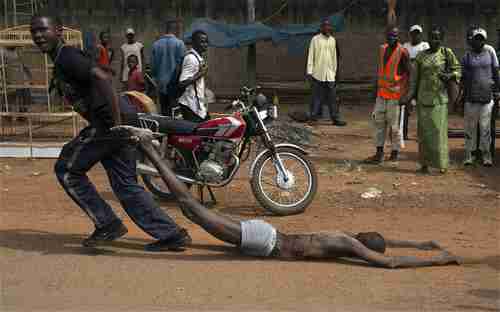 |
Soldiers in the Central African Republic, the ones who are supposed to bring peace to the CAR, brutally lynched a man on Wednesday, right at the end of a ceremony where the new president, Catherine Samba-Panza. Speaking to the assembled soldiers, Samba-Panza said they would be paid salaries for the first time in five months, and said:
"I would like to renew my pride in those elements of FACA [Armed Forces of the Central African Republic] who are here and to ask them to support my actions wherever they are.
As soon as she left, soldiers grabbed a bystander, accused him of being from the Seleka militia, and then lynched him with knives and bricks, kicking him to the ground, stripping him to his underwear and stabbing him over and over. Attempts to save the man only made the mob even more furious. All of this took place in front of reporters from AP, AFP and Reuters.
What makes this different even from the conflict in Syria is its raw, personal, man to man brutality. In Syria, you have the genocidal monster president Bashar al-Assad conducting "industrial strength" torture and extermination on his own civilians. The war in Syria might well end if al-Assad stepped down. In the case of al-Qaeda linked jihadists, you have mass murder through bombings of markets and mosques, and some tortures and individual murders.
But in CAR, this kind of lynching is going on now across the country, by self-directed individuals. What makes today's story unique is that it's done by soldiers in front of international reporters. The only other country where this level of personal viciousness is occurring is Burma (Myanmar), where Buddhist mobs are slaughtering entire Muslim communities.
As I've explained several time, CAR's last generational crisis war was the 1928-1931 Kongo-Wara Rebellion ("War of the Hoe Handle"), which was a very long time ago, putting CAR deep into a generational Crisis era, where a new crisis war is increasingly likely. This is because all the survivors of that war are long gone, and nobody in the younger generations have any personal memories of its horrors.
Many people are describing the CAR war in religious terms, as Muslims versus Christians, and that's true to an extent. But there's no evidence that religion has anything to do with it except to identify members of the two identity groups. There have been no stories of priests or imams telling their respective "flocks" that they should go out and kill people. This is a raw ethnic/tribal war, with the mass hatred and lynchings coming from ordinary people, not from their politicians or their clerics. And week after week it's building into a new generational crisis war of ghastly proportions. National Post (Toronto) and Telegraph (London)
With memories of Mao Zedong's Great Leap Forward of the late 1950s, when tens of millions of Chinese died of starvation, still in the minds of many Chinese, almost nothing concerns Chinese officials more than food security and food self-sufficiency. But with a huge and growing population and demand for food, in the face of fast-depleting water, land and labor resources, China is actually less self-sufficient, and depends on food imports, especially from the United States, to feed itself.
To better safeguard the country’s food security, China is trying to diversify its food imports away from the US, to build its own global food supply system by investing in overseas agricultural resources. In Central Asia, China leases or controls hundreds of thousands of hectares of farmland in Tajikistan and Kazakhstan.
In 2012, China contributed $1 billion to a joint Russia-China fund to invest in agriculture and timber in Russia, leasing 600,000 hectares of land and 800,000 hectares of forests.
China is expanding agricultural trade with Europe, especially leading food exporters in France, the Netherlands and Germany. An interesting footnote to the continuing political confrontation in Ukraine is China has loaned $3 billion to Ukraine to develop its agriculture, in return for which, Ukraine exports corn to China.
From the point of view of Generational Dynamics, China is headed for both a world war and an internal civil war. The internal war would be triggered by unemployment or food shortages, as has happened repeatedly in China's history. S. Rajaratnam School of International Studies (RSIS)
Philippine President Benigno Aquino recently called on world leaders not to "appease" China and drew a parallel to the 1938 decision to give Czechoslovakia's Sudetenland to Adolf Hitler's Germany. This is the same point that I've been making for several years, when I refer to China's "Lebensraum" policy. China is claiming vast areas of the South China Sea, including regions that that have historically belonged to Vietnam, Brunei, Malaysia, Indonesia and the Philippines, and has threatened to use its vast military power to threaten and subdue any neighboring nation that disobeys its orders.
Last year, the Philippines decided to challenge China's claims by submitting the case to a United Nations tribunal for adjudication. China contemptuously denounced that attempt, saying that everything in the South China Sea belongs to China, and nobody but China has the right to decide what belongs to China.
On Wednesday, Danny Russel, the US assistant secretary of state for East Asian and Pacific affairs, said:
"Any Chinese claim to maritime rights not based on claimed land features would be inconsistent with international law.China could highlight its respect for international law by clarifying or adjusting its claim to bring it into accordance with international law of the sea."
I believe that the reference to the phrase "claimed land features" means that if James Shoal is right off the coast of Malaysia, and thousands of miles from China, then that region belongs to Malaysia, not to China. (See "29-Jan-14 World View -- China's military moves to seize Malaysia's James Shoal")
Tensions have been growing in the South China Sea because of China's military belligerence. Russel's statement is certain to bring new angry denunciations from the Chinese. AFP
(Comments: For reader comments, questions and discussion, see the 6-Feb-14 World View -- Another gory lynching in Central African Republic, this time by soldiers thread of the Generational Dynamics forum. Comments may be
posted anonymously.)
(6-Feb-2014)
Permanent Link
Receive daily World View columns by e-mail
Donate to Generational Dynamics via PayPal
Corruption in Europe matches corruption in Washington
This morning's key headlines from GenerationalDynamics.com
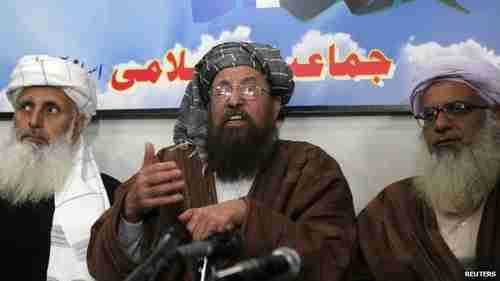 |
Tuesday was to be a "historic day" for Pakistan, for this was the day that Pakistan's government would open peace talks with the Pakistani Taliban (Tehrik-e-Taliban - TTP) to end the endless bombings and other terror attacks that the TTP perpetrates almost daily.
The talks were to begin on Tuesday. The TTP representatives showed up for the meeting, but the government representatives did not. The government issued a statement to the furious TTP representatives that they had to check something out about the negotiating teams.
The question of negotiating teams has been part of the joke leading up to Tuesday's scheduled meeting. The TTP negotiators could not make any binding decisions on behalf of the TTP, so the talks were just for show from their side. But even more laughable is the fact that the TTP asked Imran Khan to be one of the negotiators on the side of the TTP. Imran Khan is a former cricket superstar who has become a vitriolically anti-American politician, whose participation as a TTP negotiator would be totally inappropriate.
Even if the TTP leaders agreed to stop terrorist attacks, their decision would not be binding on other TTP-related terrorist groups in Pakistan. Probably the worst is Lashkar-e-Janghvi (LeJ), which has publicly and firmly announced as its goal the extermination of all Shia Muslims in Pakistan, and has been methodically setting off bombs in order to achieve that goal. As recently as January 21, blew up a bus of Shia pilgrims returning from Iran, killing 24. LeJ is not going give up these attacks, even if the TTP makes some deal.
The volume of terrorist attacks in Pakistan is enormous. In January alone, terrorism resulted in at least 460 fatalities, according to the South Asia Terrorism Portal (SATP). There have been at least 70 explosions in January, resulting in 167 deaths. To think that this flood of terrorist attacks will suddenly stop because of some "peace talks" with the Taliban is absurd. Many Pakistanis agree. One editorialist calls the peace talks "appeasement" and says, "The postponement of talks leads one to hope the prime minister has finally realized that the TTP is in fact playing tricks with the government." Pakistan Today and South Asia Terrorism Portal (SATP - India) and BBC
A new "EU Anti-Corruption Report" from the European Commission paints a very bleak picture. According to the report, Europeans believe that the only way to succeed is through political connections, and that corruption is a big problem. A rising number believe that it's getting worse, especially in Greece, Spain and Italy. According to one commentator in Brussels:
"Europe's problem is not so much with small bribes on the whole. It's with the ties between the political class and industry.There has been a failure to regulate politicians' conflicts of interest in dealing with business. The rewards for favoring companies, in allocating contracts or making changes to legislation, are positions in the private sector when they have left office rather than a bribe."
This may be what's happening in Brussels, but it's also what's happening in Washington. It's almost beyond belief that thousands of (Gen-X) bankers committed massive fraud in the 2003-8 time period, purposely creating trillions of dollar's worth of synthetic securities backed by faulty subprime mortgages, and then sold them to investors knowing that they were fraudulent. And NOT ONE SINGLE PERSON has gone to jail for those crimes. The Obama administration adamantly refuses to prosecute these criminals and criminal organizations, which, incidentally, donated millions of dollars to Obama's campaigns. And then you have the administration dispensing Obamacare favors, exemptions and dispensations to labor unions and other administration cronies, while using the IRS to target political enemies, and you have the worst corruption in my lifetime, and you have exactly what this new report says is happening in Europe. BBC and Reuters
(Comments: For reader comments, questions and discussion, see the 5-Feb-14 World View -- Pakistan 'peace process' collapses on first day thread of the Generational Dynamics forum. Comments may be
posted anonymously.)
(5-Feb-2014)
Permanent Link
Receive daily World View columns by e-mail
Donate to Generational Dynamics via PayPal
Bitterness between U.S. and Israel increases as 'peace process' collapses
This morning's key headlines from GenerationalDynamics.com
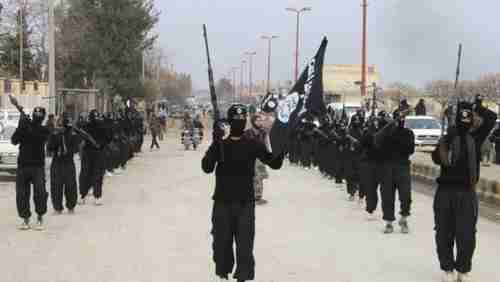 |
Al-Qaeda's top leader, Ayman al-Zawahiri, is repudiating any connection with the Islamic State in Iraq and Syria/Sham/theLevant (ISIS or ISIL). A statement by al-Qaeda General Command was published on a jihadist web site on Sunday:
"[Al-Qaeda] has no connection with the group called the ISIS, as it was not informed or consulted about its establishment. It was not pleased with it and thus ordered its suspension. Therefore, it is not affiliated with al-Qaeda and has no organizational relationship with it. Al-Qaeda is not responsible for ISIS's actions."
There are three groups of anti-Assad militants in Syria: The "moderate" Syrian National Coalition (SNC); the Islamic Front, or Jabhat al-Nusra, consisting of Syrian citizens who are salafists; and the jihadists in ISIS, an extension of the old Al-Qaeda in Iraq, consisting of many foreign fighters.
ISIS has essentially become an ally of Syria's president Bashar al-Assad, in that both of these groups are cooperating with each other to fight the other rebel groups (SNC and al-Nusra). Al-Assad's army has been focusing its bombing campaigns on rebel areas, but has not been striking any ISIS camps or supporters. This has apparently distressed al-Zawahiri, who would like to see the rebels to focus on fighting the Shia/Alawite al-Assad, rather than each other.
However, al-Zawahiri's statement is unlikely to make much difference in Syria. ISIS is attracting jihadists from all over the world, and it's becoming increasingly powerful. The fight between ISIS and al-Nusra is likely to get a lot more bloody. BBC and AFP and The National (UAE)
The Dow Industrials index fell more than 2% on Monday, continuing a decline that has been almost steady since the beginning of 2014. The experts blamed Monday's plunge on bad manufacturing data, and other an apparently slowdown in China.
The S&P 500 Price/Earnings index (stock valuations) fell to 16.9%. This is lower than 18.72 peak of last year, but it's still astronomically high by historical standards. It was only as recently as 1982 that the P/E index was 6, and it's about due to return to that level, as it does periodically, every 30 years or so. This would push the Dow Jones Industrial Average from its current 15,400 down to the 3,000-4,000 level, or lower, which is what Generational Dynamics is predicting.
A week ago, I wrote "'that 1929 feeling' may be back on Wall Street". As I said, what I'm looking for a certain pattern that preceded the 1929 crash.
For the seven weeks preceding the 1929 crash, starting from 9/3/29, the market declined gradually, but with some wild gyrations along the way. That's the pattern I'm watching for today. The market has, in fact, been declining gradually since Jan 1, but we've only begun to see the wild gyrations. If the decline continues, and if there's a fall of 6% one day, followed by a rise of 8% the next day, or some sort of wild gyration like that, then that would be the pattern I'm looking for.
However, there are no guarantees, one way or the other. The market might fall 10%, and then go back up. The stock market is in a huge bubble, and Generational Dynamics predicts a major financial panic and crisis, but the exact date that the bubble will burst is impossible to predict. But as I said, this is the first time in a long time that I've thought that the market has that "1929 feeling." Reuters
As the April 29 deadline for an Israeli-Palestinian peace agreement approaches, with not even the whisper of any sort of agreement in sight, the bitterness and mutual finger-pointing between Israel's Benjamin Netanyahu administration versus America's Obama administration is increasing.
In an attempt to get Israel to make additional concessions, especially to renounce any further West Bank settlement construction, Secretary of State John Kerry said at the weekend international security conference in Munich:
"You see for Israel there is an increasing deligitimization campaign that has been building up. People are very sensitive to it. There are talk of boycotts and other kinds of things. Are we all going to better with all of that?"
The Israeli cabinet took these remarks as a direct threat that the U.S. not oppose an international boycott of Israel, and might even support it.
"Attempts to impose a boycott on the State of Israel are immoral and unjust, [and] they will not achieve their goal."
Kerry later issued a statement saying that the Obama administration opposes any boycotts of Israel. The relationship between the Netanyahu and Obama administrations has been testy from the start, but as the deadline approaches, it's becoming more hostile. It was just two weeks ago that an Israeli minister said that Kerry was "acting out of misplaced obsession and messianic fervor. ( "15-Jan-14 World View -- Israeli remarks about Kerry grow into international incident".)
Kerry is now calling the April 29 deadline "artificial," indicating that he wants the so-called "peace process" to continue into the future. However, there may be a problem. The main reason that the Palestinians haven't walked out is because Israel is releasing 104 prisoners, in four evenly spaced groups of 26, from Israeli jails. If the "peace talks" are to continue, then Kerry will have to convince Israel to release some more prisoners, or to make some other concession. VOA and Jerusalem Post
(Comments: For reader comments, questions and discussion, see the 4-Feb-14 World View -- Monday's market plunge continues 'that 1929 feeling' thread of the Generational Dynamics forum. Comments may be
posted anonymously.)
(4-Feb-2014)
Permanent Link
Receive daily World View columns by e-mail
Donate to Generational Dynamics via PayPal
Syria's al-Assad has week of victories, including rebel infighting
This morning's key headlines from GenerationalDynamics.com
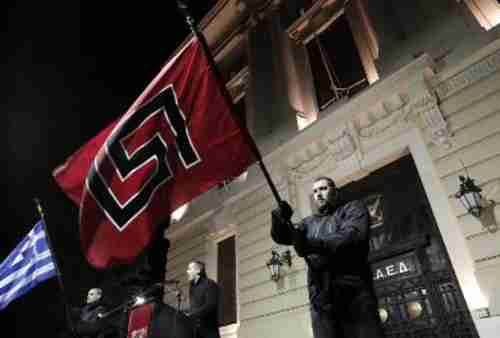 |
Faced with threats from Greece's authorities to ban the neo-Nazi Golden Dawn political party from participating in the May 25 elections, spokesman Ilias Kassidiaris announced the founding of a new party, National Dawn, as a backup in case Golden Dawn is banned. Kassidiaris was speaking at a rally of about 3,000 Golden Dawn supporters on Saturday, and said,
"Patriots will have a party to vote for in the next election if (authorities) go ahead with the coup to ban Golden Dawn."
Golden Dawn was declared a "criminal organization" last year, after September 18 when self-identified Golden Dawn members murdered a white Greek civilian rapper, Pavlos Fyssas, or Killah P, who rapped against the kind of racism that Golden Dawn practices.
Greek police arrested the party's leader, Nikolaos Michaloliakos, and dozens of party members, including four MPs. The charges include homicide, attempted homicide, money laundering, blackmail, grievous bodily harm, and other serious crimes.
Golden Dawn was a little-known fringe party until the financial crisis, when it exploded in popularity. It is highly nationalistic, has a Swastika-like emblem on its flag, and supports deportation of all non-Greeks, even those who are citizens, to rid Greece of the "stench" of immigrants. It has conducted hate campaigns against immigrants, and is believed to have targeted immigrants with violence.
Two opinion polls published last week showed the party would get 8.9% to 10.3% of the vote if elections were held now. Kathimerini (Athens) and Reuters
Syria's genocidal monster president Bashar al-Assad had good reason to celebrate this weekend, as one victory led to another last week.
Two anti-Assad rebel groups are now fighting fiercely with one another. The al-Qaeda linked Islamic State in Iraq and the Levant (ISIL) killed a commander in a Syrian salafist rebel group, Jabhat al-Nusra (the Islamic Front), leading to continued gunfights and bombings between the two groups. ISIL has attracted foreign jihadists from all over the world, and it currently has control of parts of Iraq and Syria, and is trying to take full control of a larger region. ISIL has essentially become an ally of al-Assad for two reasons: ISIL is killing al-Assad's Syrian rebels, and ISIL allows al-Assad to maintain the fiction that he's fighting al-Qaeda terrorists, when in fact he's committing crimes against humanity and war crimes against Syrian civilians. In fact, al-Assad's bombers are reported to be very carefully avoiding ISIL camps, so al-Assad isn't fighting al-Qaeda terrorists at all.
Other good news for al-Assad this week:
Al-Assad is winning on the battlefield, and has no reason to compromise with anyone on anything. Indian Express and AP
(Comments: For reader comments, questions and discussion, see the 3-Feb-14 World View -- Greece's neo-Nazi Golden Dawn party will adopt new name if banned thread of the Generational Dynamics forum. Comments may be
posted anonymously.)
(3-Feb-2014)
Permanent Link
Receive daily World View columns by e-mail
Donate to Generational Dynamics via PayPal
Ukraine protests lead to further crackdown on free speech in Russia
This morning's key headlines from GenerationalDynamics.com
 |
The anti-government protests in Kiev, the capital city of Ukraine, have been simmering since late November, growing into violence within the last two weeks. But now it's turned into a major proxy political shouting match between Russia and the West, because Dmytro Bulatov, a 35 year old opposition activist, who had been presumed killed two weeks ago, was found alive in a Kiev suburb, where he had been dumped, severely scarred and missing part of one ear. He said that he had been kidnapped, and then tortured and beaten for a week by men with Russian accents. Ukraine's pro-Russian government is denying any complicity in the kidnapping and torture, but it's widely assumed that the men with the Russian accents were government thugs.
The anti-government protests began on November 21 after the president, Viktor Yanukovych, did a major flip-flop and refused to sign a trade deal with the European Union, after saying for months that would sign. The move was seen as turning away from Europe, and turning toward Russia, which displeased the ethnic Ukrainians in the east, but pleased the ethnic Russians in the west. This view was reinforced when Russia's president Vladimir Putin offered Ukraine a $15 billion loan, thought to be incentive to encourage Yanukovych to join Putin's Eurasian Customs Union.
The protests had been dying down until January 16, when the parliament passed a harsh new law restricting protests and freedom of speech. The protests became larger and more violent, and remain so until this day, even though Yanukovych has made several concessions since then: His prime minister and cabinet have all resigned, and the anti-protest law has been repealed. However, the protesters see these concessions as a sign of weakness, and are demanding the resignation of Yanukovych. Yanukovych has been out of sight for a week with "the flu," but aides say he's refusing to resign.
The reappearance of activist leader Bulatov, apparently back from the dead but badly beaten, once again escalated the protests.
There had been some initial reports that Bulatov, who is recuperating in the hospital, was going to be arrested on charges related to his anti-government activism, but government officials say that they are only detaining him in order to protect him. Kyiv Post and Interfax-Ukraine
The news of the torture of Dmytro Bulatov was a bombshell that hit in the middle of a long-scheduled security conference being held in Munich. U.S. Secretary of State John Kerry met with opposition leaders and said on Saturday in Munich that the U.S. and the European Union supported the people of Ukraine as they sought a stronger democracy, and should not be coerced into associating with one country (Russia). According to Kerry:
"[The people of Ukraine are] fighting for the right to associate with partners who will help them realize their aspirations. They have decided that means their futures do not have to lie with one country alone, and certainly not coerced. The United States and EU stand with the people of Ukraine in that fight."
Kerry has apparently sided with the opposition, and is receiving criticism because he seems to be saying that it's democracy to overthrow a democratically elected government through street demonstrations.
According to Russia's foreign minister Sergei Lavrov, also speaking in Munich on Saturday:
"What does the inciting of street protests, which are growing increasingly violent, have to do with promoting democratic principles?Why do we not hear statements of condemnation toward those who seize government buildings, attack and burn police officers, and voice racist and anti-Semitic slogans? Why do senior European politicians de facto encourage such actions, while at home they swiftly and harshly act to stop any impingement on the letter of the law?"
It's funny to see Lavrov, a man with no morals whatsoever, claim outrage and try to take a moral stand. He might have been reminded that Russia invaded Georgia in 2008, and annexed two Georgian provinces.
The Ukraine situation has grown from a local matter involving anti-government demonstrators into a major international disagreement between Russia and the West. Al-Jazeera and Russia Today
Russian state TV is claiming that Russia's liberal news outlets "are the leaders of a fifth column that is preparing a Kyiv-style ‘Maidan’ revolution in Moscow," financed by Russian enemies in the West. The most immediate target is a Moscow-based independent TV cable news channel Dozhd (meaning "Rain"). On January 26, Dozhd ran a panel and asked viewers to vote if Leningrad (today St. Petersburg), besieged during World War II by Nazi troops, should have surrendered to save civilian lives (the siege or blockade of Leningrad lasted from 1941 to 1944 and more than a million civilians died, mainly from starvation). The St. Petersburg prosecutor’s office announced it has begun an official investigation of Dozhd: "To determine if the channel has crossed the line of permissibility during the celebration of the 70th anniversary of the end of the blockade of Leningrad." Many cable services are dropping Dozhd from their lineups, and Pravda has called the Dozhd channel a liberal outpost run by Jews, homosexuals and "insects." The Ukraine protests are generating an almost hysterical reaction in Moscow, and splitting the power base of president Vladimir Putin, as Putin himself is taking a cautious approach, while nationalists and revisionists desperately call for a more aggressive, interventionist policy in Ukraine. Undoubtedly, the question of Russian military intervention in Ukraine is at least being considered in Moscow. Jamestown
(Comments: For reader comments, questions and discussion, see the 2-Feb-14 World View -- Torture of Ukraine dissident polarizes U.S.-Russia relations thread of the Generational Dynamics forum. Comments may be
posted anonymously.)
(2-Feb-2014)
Permanent Link
Receive daily World View columns by e-mail
Donate to Generational Dynamics via PayPal
Three bankers commit suicide in one week
This morning's key headlines from GenerationalDynamics.com
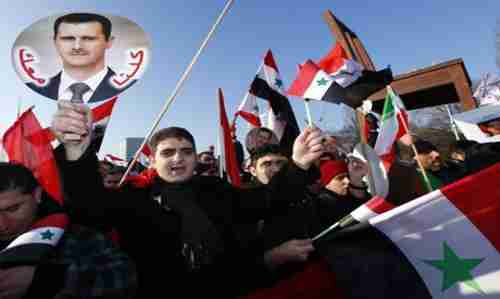 |
The so-called "Geneva II" Syria peace conference in the Swiss town of Montreux ended on Friday with no agreement on peace, no agreement on humanitarian aid, and no commitment to another meeting. According to UN envoy Lakhdar Brahimi, who was conference leader:
"Progress is very slow indeed, but the sides have engaged in an acceptable manner. This is a modest beginning on which we can build.The gaps between the sides remain wide; there is no use pretending otherwise. Nevertheless, during our discussions, I observed a little bit of common ground – perhaps more than the two sides realize or recognize.
Things have gone so far down that they are not going to get out of the ditch overnight."
The Friends of Syria, a Western alliance that backs al-Assad's foes, said, ""The regime is responsible for the lack of real progress in the first round of negotiations. It must not further obstruct substantial negotiations and it must engage constructively in the second round of negotiations." The U.S. State Department said that the Syrian government "continues to play games."
Syria's deputy prime minister, Walid al-Moallem, gave two reasons for the failure of the conference:
"[One reason was] the non-seriousness and non-ripeness of the other side and its threat of blowing up the meetings many times and stubbornness on one issue as if we come here for one hour to hand them over everything and return and this indicates the illusions they live.The second reason was the US flagrant interference in the talks and the tense atmosphere through which the US wanted to cover Geneva meeting by its actual appearance and its flagrant intervention in the meeting affairs were also reasons that made the talks don’t lead to tangible outcomes."
Brahimi says that a new meeting is scheduled to begin on February 10, but the Syrian delegation denies that it's agreed to attend.
Debka's subscriber-only newsletter (sent to me by a subscriber) says that its intelligence sources are telling quite a different story. Debka, which sometimes gets things wrong, claims that the meeting in Montreux was just for show for the media, and that the real negotiations are going on at a meeting in Bern, with representatives from the U.S., Russia, Syria, and Syrian opposition representatives. The Mideast Arab countries, Saudi Arabia, Qatar, Oman and the UAE, were not invited. I found no confirmation of this story anywhere, so make of it what you will, Dear Reader. Daily Star (Lebanon)/AFP and Syria Online (Damascus) and Debka
As we wrote several weeks ago ( "9-Jan-14 World View -- Eurozone plummets into deflation"), the eurozone inflation rate has been falling steadily for over a year, raising very real concerns that the eurozone is headed into deflation. The statistics for January are out, and the eurozone CPI was just 0.7%, substantially lower than the 0.9% predicted by expert economists. This raises more alarm bells over deflation, which is often the precursor to a major economic depression. As long-time readers know, Generational Dynamics predicts that we're headed for a deflationary spiral and a major global economic crisis, the worst of which is far from over. CNBC
It's hard to know what to make of this, but three bankers have committed suicide in the last week:
It's well known that suicides occur most often around the Christmas holiday season, so it's possible that the timing of these three suicides was coincidental. But it's also true that a number of bankers and investors jumped to their deaths during the Great Depression, usually from hotel rooms, and that the overall suicide rate today has surged even higher than during the Great Depression (usually because of unemployment). A financial crisis sends many people to financial ruin, but more than that, a financial crisis exposes a lot of crime, particularly embezzlement.
John Kenneth Galbraith described what happened during the Great Depression in his 1954 book, The Great Crash - 1929, as follows:
"In many ways the effect of the crash on embezzlement was more significant than on suicide. To the economist embezzlement is the most interesting of crimes. Alone among the various forms of larceny it has a time parameter. Weeks, months, or years may elapse between the commission of the crime and its discovery. (This is a period, incidentally, when the embezzler has his gain and the man who has been embezzled, oddly enough, feels no loss. There is a net increase in psychic wealth.) At any given time there exists an inventory of undiscovered embezzlement in -- or more precisely not in -- the country's businesses and banks. This inventory -- it should perhaps be called the bezzle -- amounts at any moment to many millions of dollars. It also varies in size with the business cycle. In good times people are relaxed, trusting, and money is plentiful. But even though money is plentiful, there are always many people who need more. Under these circumstances the rate of embezzlement grows, the rate of discovery falls off, and the bezzle increases rapidly. In depression all is reversed. Money is watched with a narrow, suspicious eye. The man who handles it is assumed to be dishonest until he proves himself otherwise. Audits are penetrating and meticulous. Commercial morality is enormously improved. The bezzle shrinks.The stock market boom and the ensuing crash caused a traumatic exaggeration of these normal relationships. To the normal needs for money, for home, family and dissipation, was added, during the boom, the new and overwhelming requirement for funds to play the market or to meet margin calls. Money was exceptionally plentiful. People were also exceptionally trusting. A bank president who was himself trusting Kreuger, Hopson, and Insull was obviously unlikely to suspect his lifelong friend the cashier. In the late twenties the bezzle grew apace.
Just as the boom accelerated the rate of growth, so the crash enormously advanced the rate of discovery. Within a few days, something close to universal trust turned into something akin to universal suspicion. Audits were ordered. Strained or preoccupied behavior was noticed. Most important, the collapse in stock values made irredeemable the position of the employee who had embezzled to play the market. He now confessed.
After the first week or so of the crash, reports of defaulting employees were a daily occurrence. They were far more common than the suicides. On some days comparatively brief accounts occupied a column or more in the Times. The amounts were large and small, and they were reported from far and wide. ...
Each week during the autumn more such unfortunates were reveled in their misery. Most of them were small men who had taken a flier in the market and then become more deeply involved. Later they had more impressive companions. It was the crash, and the subsequent ruthless contraction of values which, in the end, exposed the speculation by Kreuger, Hopson, and Insull with the money of other people. Should the American economy ever achieve permanent full employment and prosperity, firms should look well to their auditors. One of the uses of depression is the exposure of what auditors fail to find. Bagehot once observed: "Every great crisis reveals the excessive speculations of many houses which no one before suspected." [pp. 132-35]
We have to remember that today there's a tremendous undercurrent of what we might call "unreported crime" going on. Thousands of bankers purposely created and sold trillions of dollars in fraudulent synthetic securities backed by faulty subprime mortgages, and not a single person has gone to jail for these crimes. If there's an increase in suicide rates among bankers, then it's possible that some kind of Karmic retribution is taking place. We'll have to wait and see what's going on. Bloomberg and Business Insider and Global Research (May 2013)
(Comments: For reader comments, questions and discussion, see the 1-Feb-14 World View -- Syria 'peace talks' end in recriminations and accusations thread of the Generational Dynamics forum. Comments may be
posted anonymously.)
(1-Feb-2014)
Permanent Link
Receive daily World View columns by e-mail
Donate to Generational Dynamics via PayPal
Web Log Summary - 2016
Web Log Summary - 2015
Web Log Summary - 2014
Web Log Summary - 2013
Web Log Summary - 2012
Web Log Summary - 2011
Web Log Summary - 2010
Web Log Summary - 2009
Web Log Summary - 2008
Web Log Summary - 2007
Web Log Summary - 2006
Web Log Summary - 2005
Web Log Summary - 2004
Web Log - December, 2016
Web Log - November, 2016
Web Log - October, 2016
Web Log - September, 2016
Web Log - August, 2016
Web Log - July, 2016
Web Log - June, 2016
Web Log - May, 2016
Web Log - April, 2016
Web Log - March, 2016
Web Log - February, 2016
Web Log - January, 2016
Web Log - December, 2015
Web Log - November, 2015
Web Log - October, 2015
Web Log - September, 2015
Web Log - August, 2015
Web Log - July, 2015
Web Log - June, 2015
Web Log - May, 2015
Web Log - April, 2015
Web Log - March, 2015
Web Log - February, 2015
Web Log - January, 2015
Web Log - December, 2014
Web Log - November, 2014
Web Log - October, 2014
Web Log - September, 2014
Web Log - August, 2014
Web Log - July, 2014
Web Log - June, 2014
Web Log - May, 2014
Web Log - April, 2014
Web Log - March, 2014
Web Log - February, 2014
Web Log - January, 2014
Web Log - December, 2013
Web Log - November, 2013
Web Log - October, 2013
Web Log - September, 2013
Web Log - August, 2013
Web Log - July, 2013
Web Log - June, 2013
Web Log - May, 2013
Web Log - April, 2013
Web Log - March, 2013
Web Log - February, 2013
Web Log - January, 2013
Web Log - December, 2012
Web Log - November, 2012
Web Log - October, 2012
Web Log - September, 2012
Web Log - August, 2012
Web Log - July, 2012
Web Log - June, 2012
Web Log - May, 2012
Web Log - April, 2012
Web Log - March, 2012
Web Log - February, 2012
Web Log - January, 2012
Web Log - December, 2011
Web Log - November, 2011
Web Log - October, 2011
Web Log - September, 2011
Web Log - August, 2011
Web Log - July, 2011
Web Log - June, 2011
Web Log - May, 2011
Web Log - April, 2011
Web Log - March, 2011
Web Log - February, 2011
Web Log - January, 2011
Web Log - December, 2010
Web Log - November, 2010
Web Log - October, 2010
Web Log - September, 2010
Web Log - August, 2010
Web Log - July, 2010
Web Log - June, 2010
Web Log - May, 2010
Web Log - April, 2010
Web Log - March, 2010
Web Log - February, 2010
Web Log - January, 2010
Web Log - December, 2009
Web Log - November, 2009
Web Log - October, 2009
Web Log - September, 2009
Web Log - August, 2009
Web Log - July, 2009
Web Log - June, 2009
Web Log - May, 2009
Web Log - April, 2009
Web Log - March, 2009
Web Log - February, 2009
Web Log - January, 2009
Web Log - December, 2008
Web Log - November, 2008
Web Log - October, 2008
Web Log - September, 2008
Web Log - August, 2008
Web Log - July, 2008
Web Log - June, 2008
Web Log - May, 2008
Web Log - April, 2008
Web Log - March, 2008
Web Log - February, 2008
Web Log - January, 2008
Web Log - December, 2007
Web Log - November, 2007
Web Log - October, 2007
Web Log - September, 2007
Web Log - August, 2007
Web Log - July, 2007
Web Log - June, 2007
Web Log - May, 2007
Web Log - April, 2007
Web Log - March, 2007
Web Log - February, 2007
Web Log - January, 2007
Web Log - December, 2006
Web Log - November, 2006
Web Log - October, 2006
Web Log - September, 2006
Web Log - August, 2006
Web Log - July, 2006
Web Log - June, 2006
Web Log - May, 2006
Web Log - April, 2006
Web Log - March, 2006
Web Log - February, 2006
Web Log - January, 2006
Web Log - December, 2005
Web Log - November, 2005
Web Log - October, 2005
Web Log - September, 2005
Web Log - August, 2005
Web Log - July, 2005
Web Log - June, 2005
Web Log - May, 2005
Web Log - April, 2005
Web Log - March, 2005
Web Log - February, 2005
Web Log - January, 2005
Web Log - December, 2004
Web Log - November, 2004
Web Log - October, 2004
Web Log - September, 2004
Web Log - August, 2004
Web Log - July, 2004
Web Log - June, 2004